Living with a dog can be a profoundly rewarding experience, offering companionship, joy, and a unique bond. However, for individuals with dog allergies, the dream of owning a canine friend can seem out of reach. Fortunately, the world of dog breeds offers a glimmer of hope: hypoallergenic dogs. These breeds are specifically recognized for producing fewer allergens, making them a more suitable option for allergy sufferers. But what exactly defines a “hypoallergenic” dog, and which breeds fit this bill?
While no dog can be declared 100% allergen-free, certain breeds are predisposed to shedding less and producing fewer of the dander, saliva, and urine proteins that trigger allergic reactions. This article delves into the fascinating world of these allergy-friendly companions, exploring their unique characteristics and the benefits they offer to those seeking to share their lives with a dog. We’ll guide you through a comprehensive list of dog breeds that don’t shed much and are considered hypoallergenic, helping you find the perfect four-legged friend to welcome into your home.
Understanding Hypoallergenic Dogs: What You Need to Know
The term “hypoallergenic” is often used to describe dogs that are less likely to cause an allergic reaction. It’s crucial to understand that no dog breed is entirely free of allergens. All dogs produce allergens, which are found in their dander (dead skin cells), saliva, and urine. However, breeds that are considered hypoallergenic typically shed less hair, which in turn means less dander is released into the environment. This reduction in airborne allergens can significantly benefit individuals with mild to moderate dog allergies, allowing them to enjoy the presence of a canine companion with a reduced risk of symptoms like sneezing, itching, or respiratory distress.
It’s important to remember that individual reactions can vary greatly. Some people may react to one hypoallergenic breed but not another, and even within the same breed, the level of allergen production can differ. Therefore, spending time with a specific dog before committing is highly recommended to gauge your personal reaction.
Why Minimal Shedding Matters for Allergy Sufferers
The primary reason why certain dog breeds are labeled “hypoallergenic” is their propensity for low shedding. Dogs shed hair as part of their natural life cycle, but breeds with continuously growing hair, or those with a single coat rather than a double coat, tend to shed less. This reduced shedding directly impacts the spread of allergens. When dogs shed less, fewer dander particles and allergens become airborne, settling on furniture, carpets, and clothing. For allergy sufferers, this means a cleaner living environment and a lower overall exposure to the triggers that cause allergic reactions.
Additionally, breeds with curly or wiry coats, such as Poodles and Terriers, often trap dander within their fur, preventing it from being released into the air as easily as it would from a dog with a straighter, looser coat. This physical characteristic plays a significant role in their hypoallergenic status.
Top Dog Breeds That Don’t Shed and Are Hypoallergenic
Here is an extensive list of dog breeds known for their low-shedding and hypoallergenic qualities, offering a diverse range of sizes, temperaments, and appearances to suit various lifestyles.
1. Poodle (Standard, Miniature, and Toy)
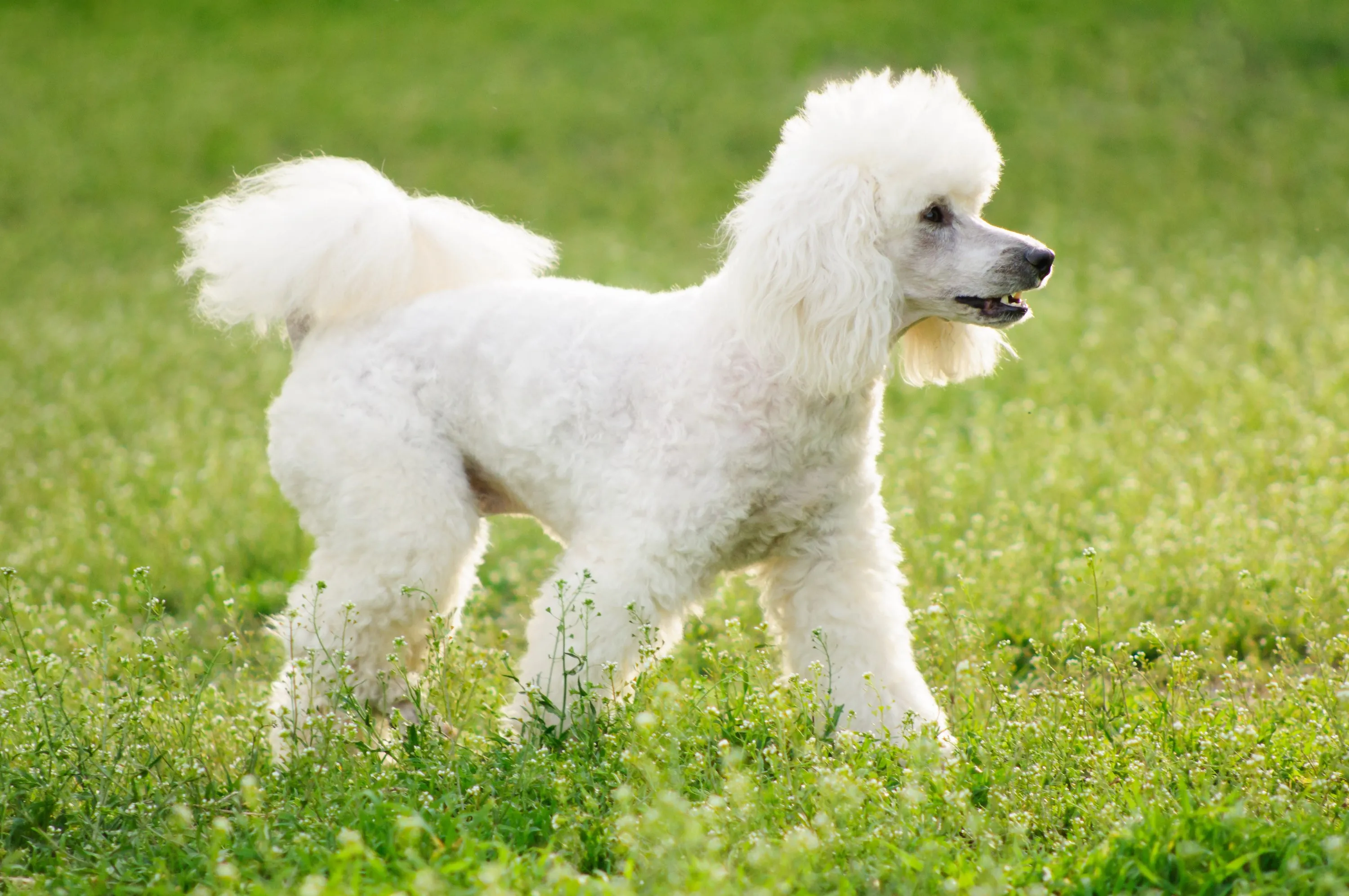 A white Poodle with a stylish haircut standing proudly outdoors
A white Poodle with a stylish haircut standing proudly outdoors
Poodles are perhaps the most well-known hypoallergenic breed, and for good reason. Their curly, dense coats are virtually non-shedding, meaning that loose hair gets trapped in the curls rather than falling out. This requires dedicated grooming, including regular brushing to prevent matting and professional grooming every few weeks. Poodles are also highly intelligent and eager to please, making them easily trainable dogs that don’t shed. They come in three sizes, catering to different living situations.
2. Yorkshire Terrier
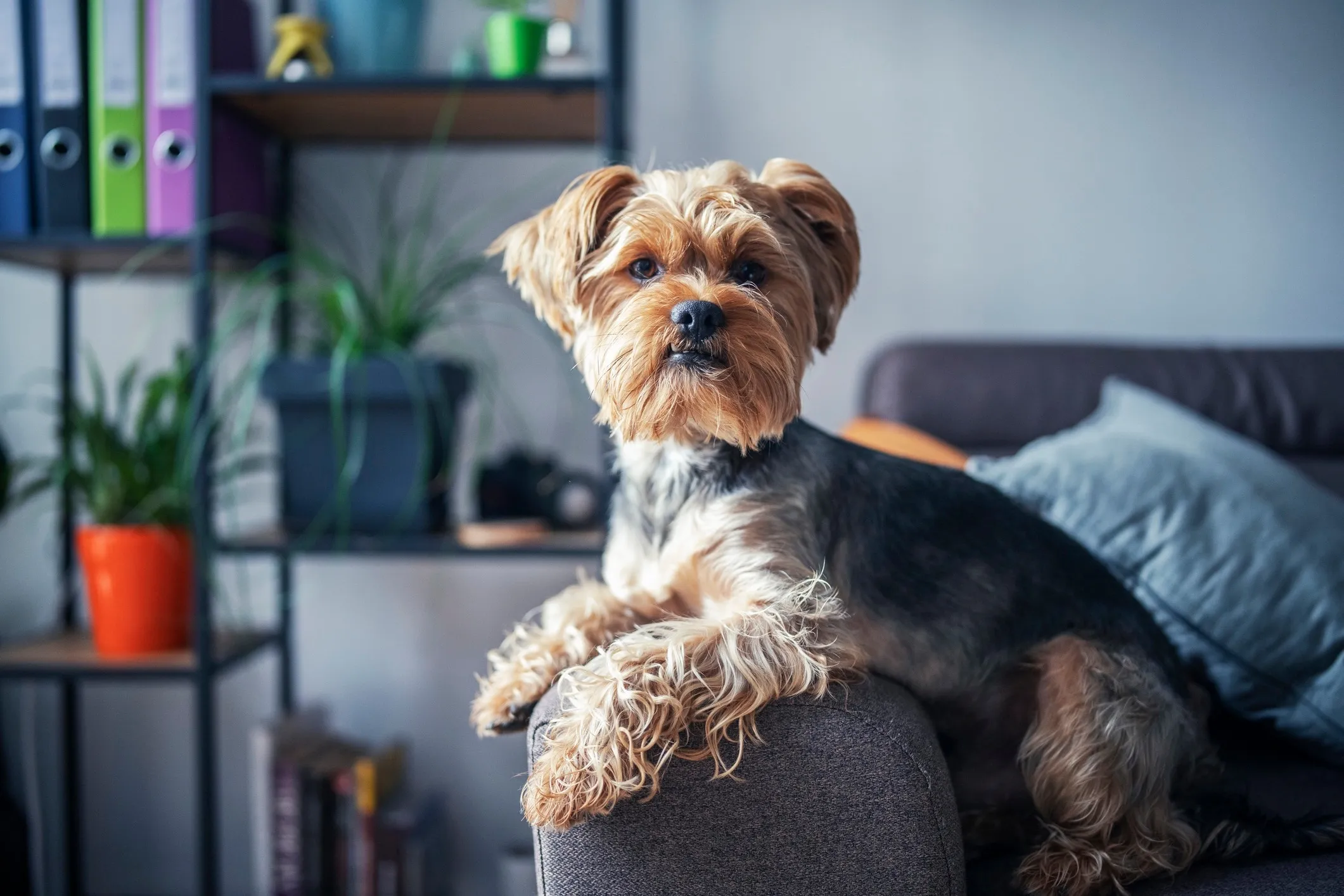 A small, tan and blue Yorkshire Terrier with silky hair looking alert
A small, tan and blue Yorkshire Terrier with silky hair looking alert
These feisty little dogs boast a long, silky coat that sheds very little. Their hair grows continuously, similar to human hair, and requires regular grooming to keep it in good condition. Yorkshire Terriers are known for their spunky personalities and affectionate nature, making them excellent companions for apartment dwellers and families alike.
3. Shih Tzu
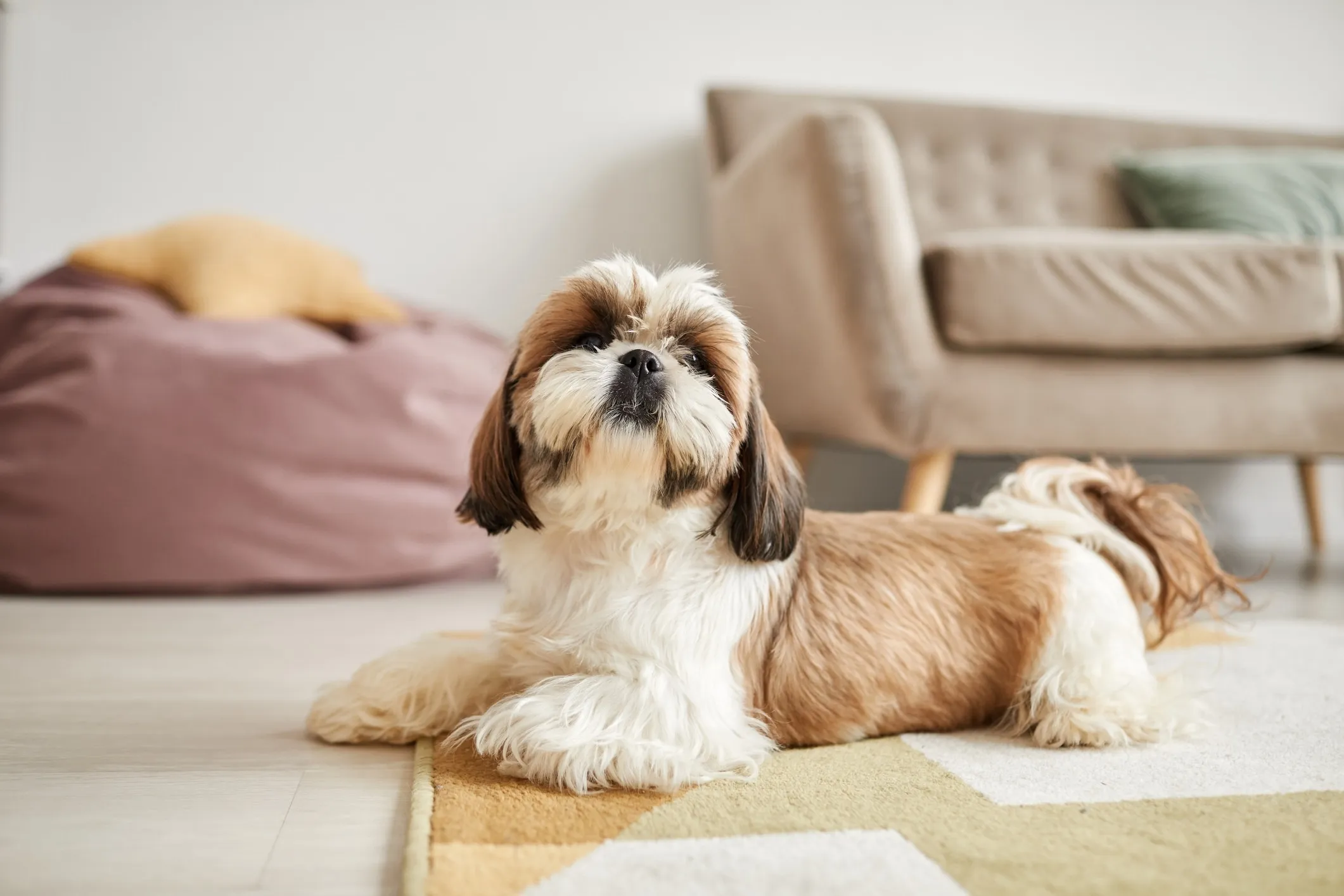 A brown and white Shih Tzu with a long, flowing coat resting on a floor
A brown and white Shih Tzu with a long, flowing coat resting on a floor
With their ancient lineage as companion dogs, Shih Tzus possess a luxurious double coat that sheds minimally. This breed is known for its friendly demeanor and enjoyment of being pampered. However, their flat face can make them susceptible to certain health issues like overheating and breathing difficulties, and they may experience tear staining, which can be managed with regular eye cleaning.
4. Miniature Schnauzer
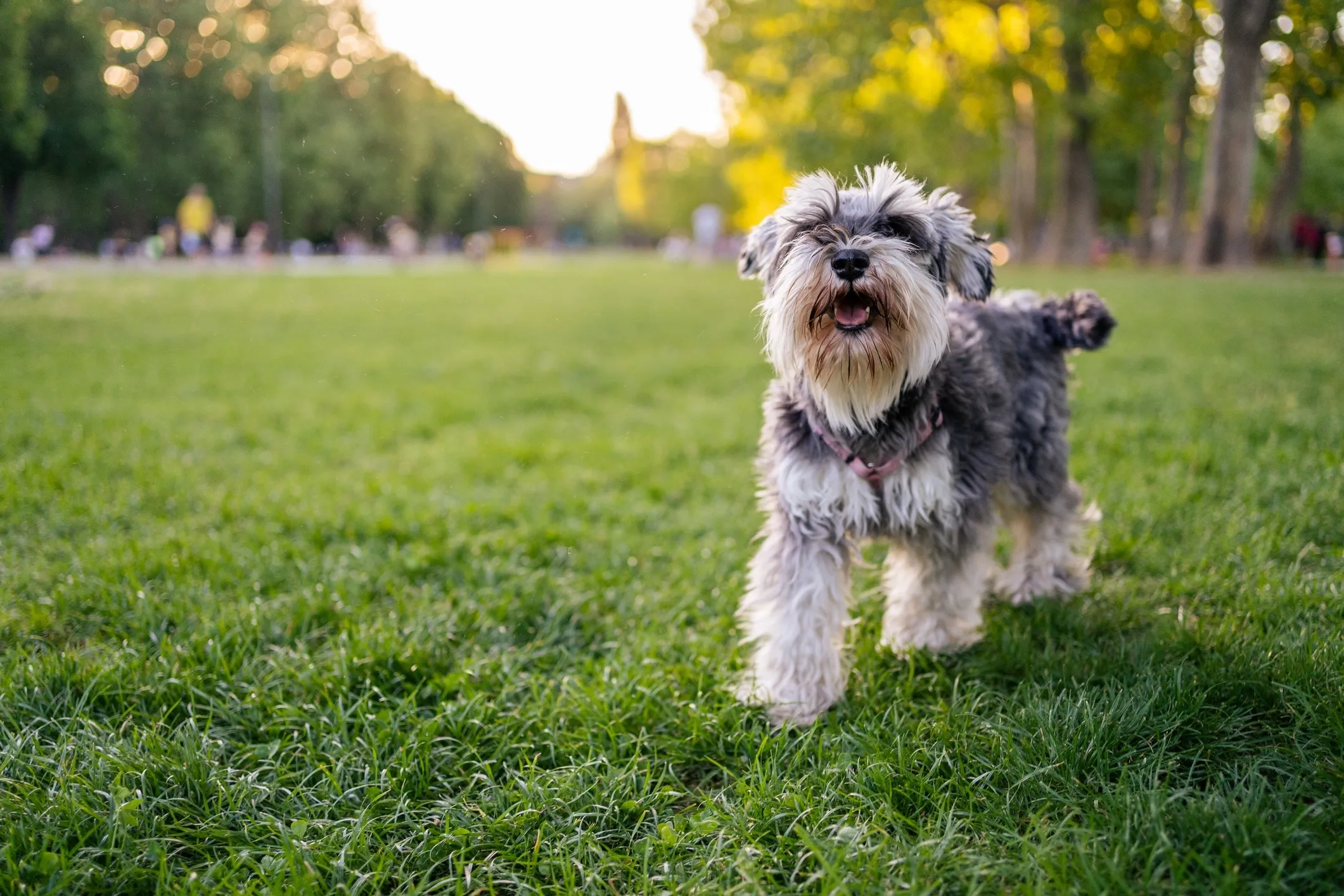 A salt-and-pepper Miniature Schnauzer wearing a pink harness in a park
A salt-and-pepper Miniature Schnauzer wearing a pink harness in a park
The smallest of the Schnauzer breeds, the Miniature Schnauzer has a wiry, double coat that sheds very little. Their personality is spirited and intelligent, making them alert and watchful companions. They require regular brushing and occasional stripping to maintain their coat’s texture and minimize shedding.
5. Standard Schnauzer
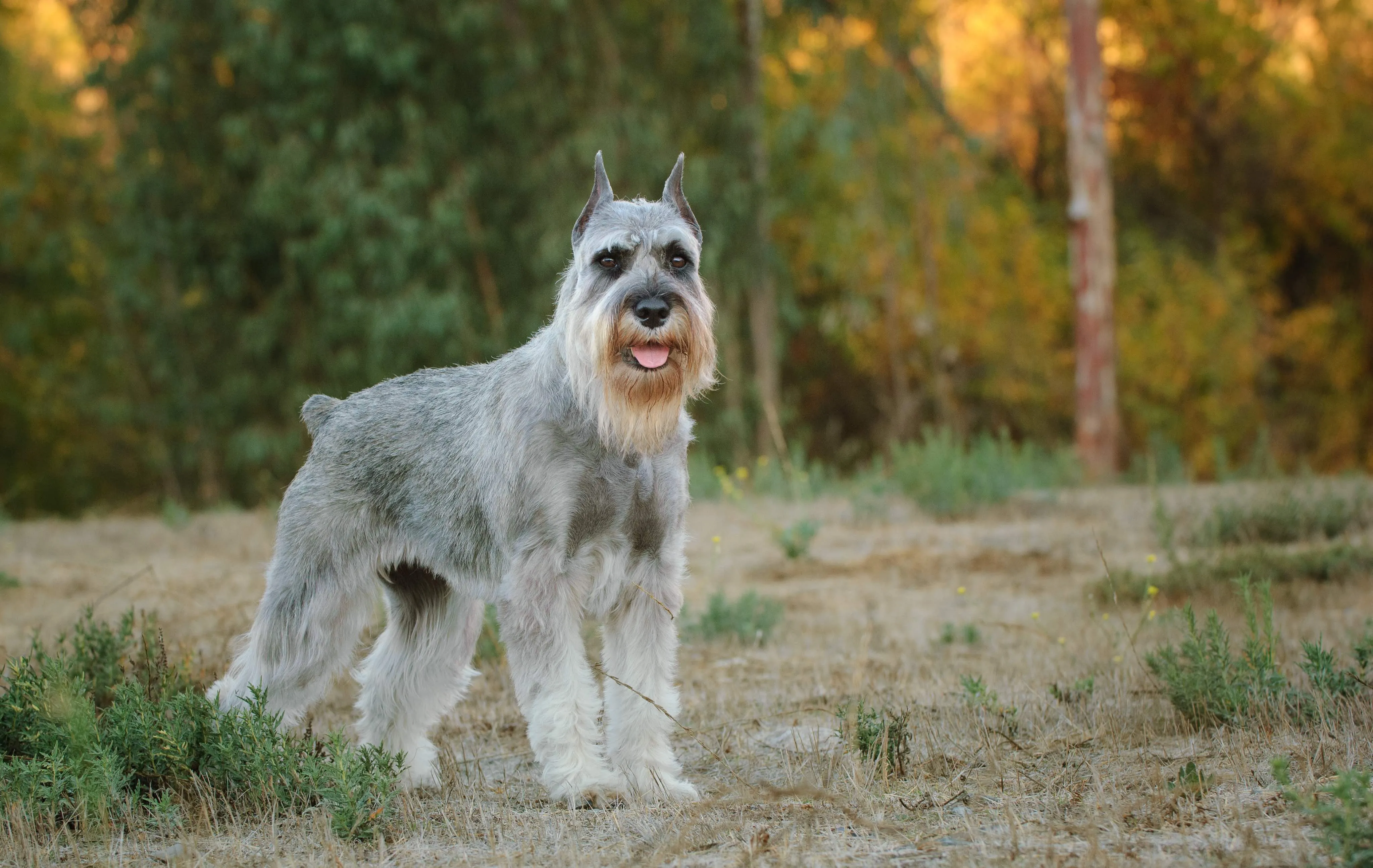 A gray Standard Schnauzer standing regally in a grassy field
A gray Standard Schnauzer standing regally in a grassy field
Sharing many of the desirable traits of their miniature counterparts, Standard Schnauzers are larger dogs with a similar low-shedding, wiry coat. They are robust, energetic, and intelligent, thriving with plenty of exercise and mental stimulation. Their exercise needs can be met with activities like long walks and engaging games of fetch.
6. Giant Schnauzer
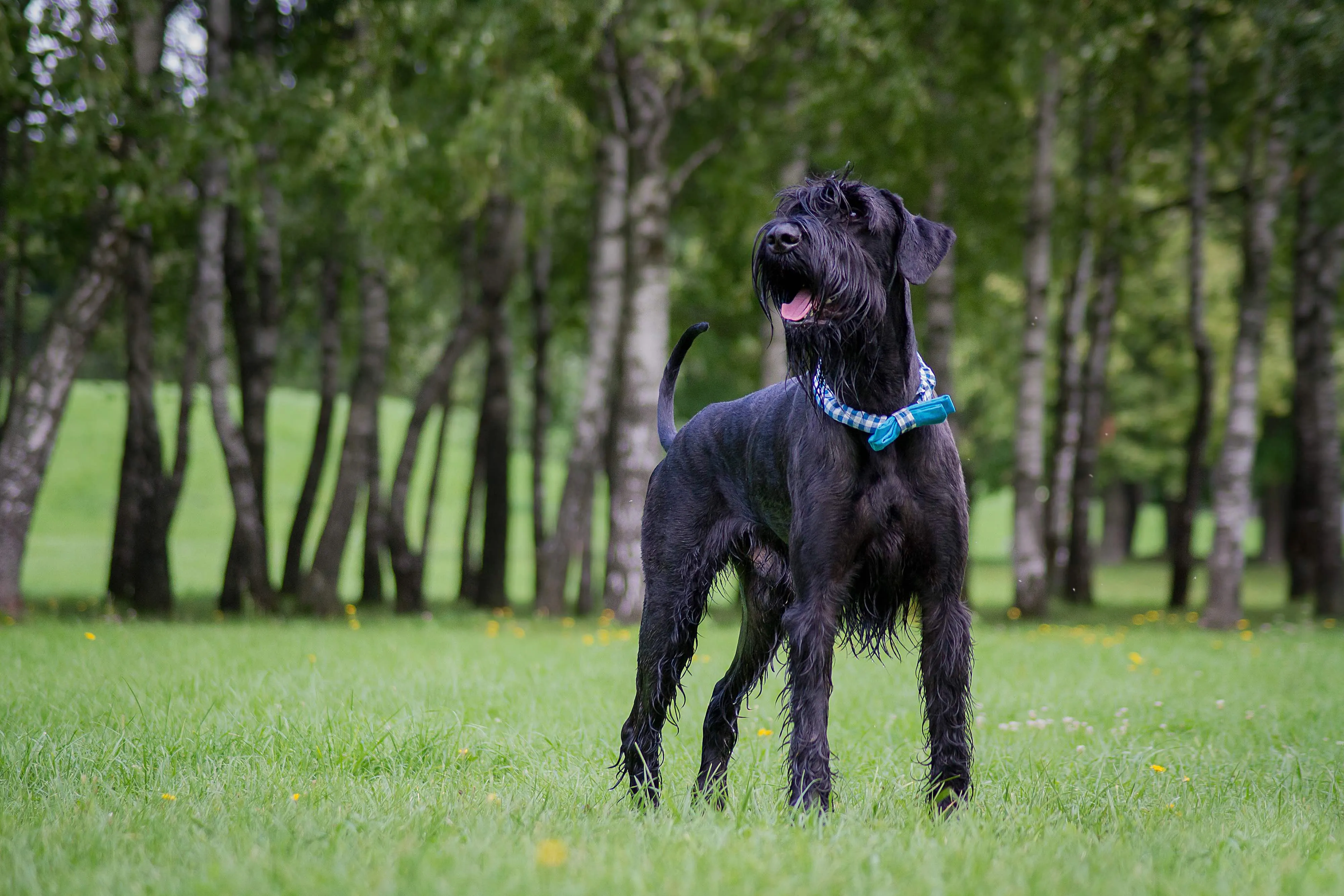 A large, black Giant Schnauzer with a sleek coat standing in a park
A large, black Giant Schnauzer with a sleek coat standing in a park
As the largest of the Schnauzer breeds, the Giant Schnauzer is a powerful and intelligent dog with a dense, wiry coat that sheds minimally. These dogs require significant amounts of exercise and mental engagement to thrive. Activities like long walks, runs, and vigorous games of fetch are essential for their well-being.
7. Bichon Frise
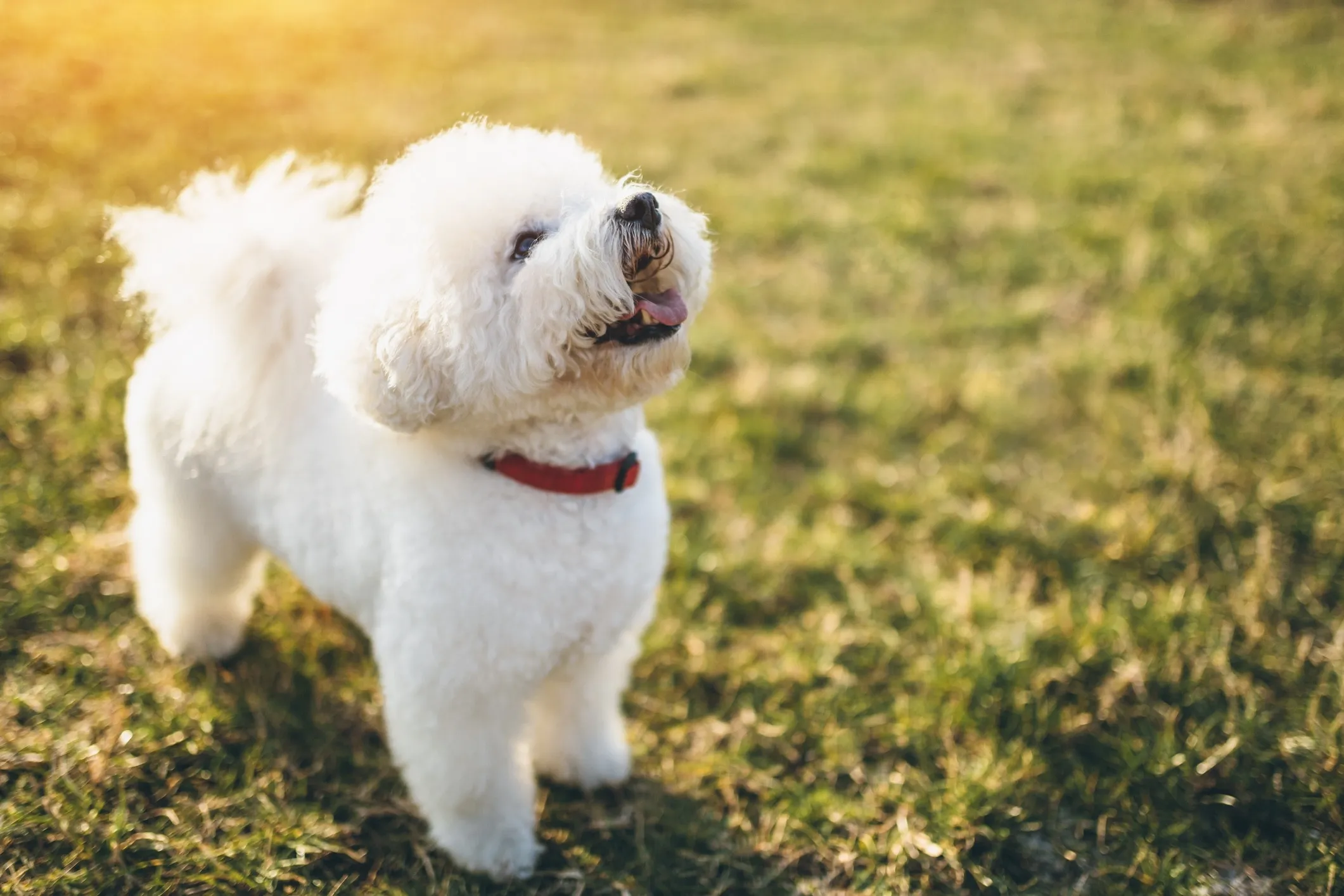 A fluffy white Bichon Frise with a cheerful expression sitting in the grass
A fluffy white Bichon Frise with a cheerful expression sitting in the grass
The Bichon Frise is a small, cheerful dog with a characteristic curly, hypoallergenic coat that sheds very little. Their playful and affectionate nature makes them wonderful family pets. Their intelligence means they are often highly trainable and enjoy learning new tricks, especially with positive reinforcement methods.
8. Chinese Crested
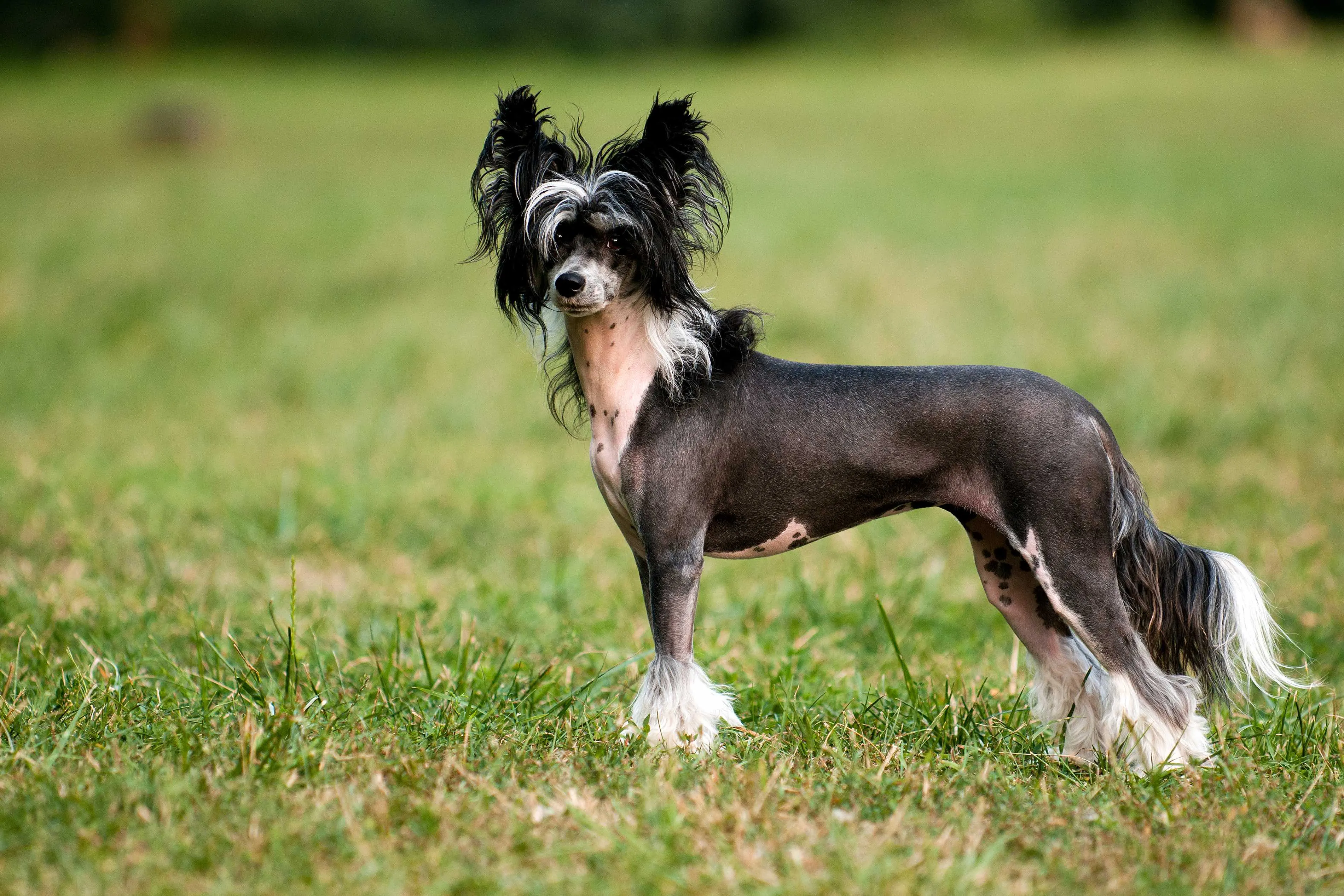 A hairless Chinese Crested dog with tufts of hair on its head, tail, and paws, looking directly at the camera
A hairless Chinese Crested dog with tufts of hair on its head, tail, and paws, looking directly at the camera
The Chinese Crested is unique for its two coat varieties: hairless and powderpuff. The hairless variety has smooth skin with tufts of hair on its head, paws, and tail, while the powderpuff is covered in long, soft hair. Both varieties are considered hypoallergenic due to minimal shedding. They are known for being playful, affectionate, and excellent companions.
9. Portuguese Water Dog
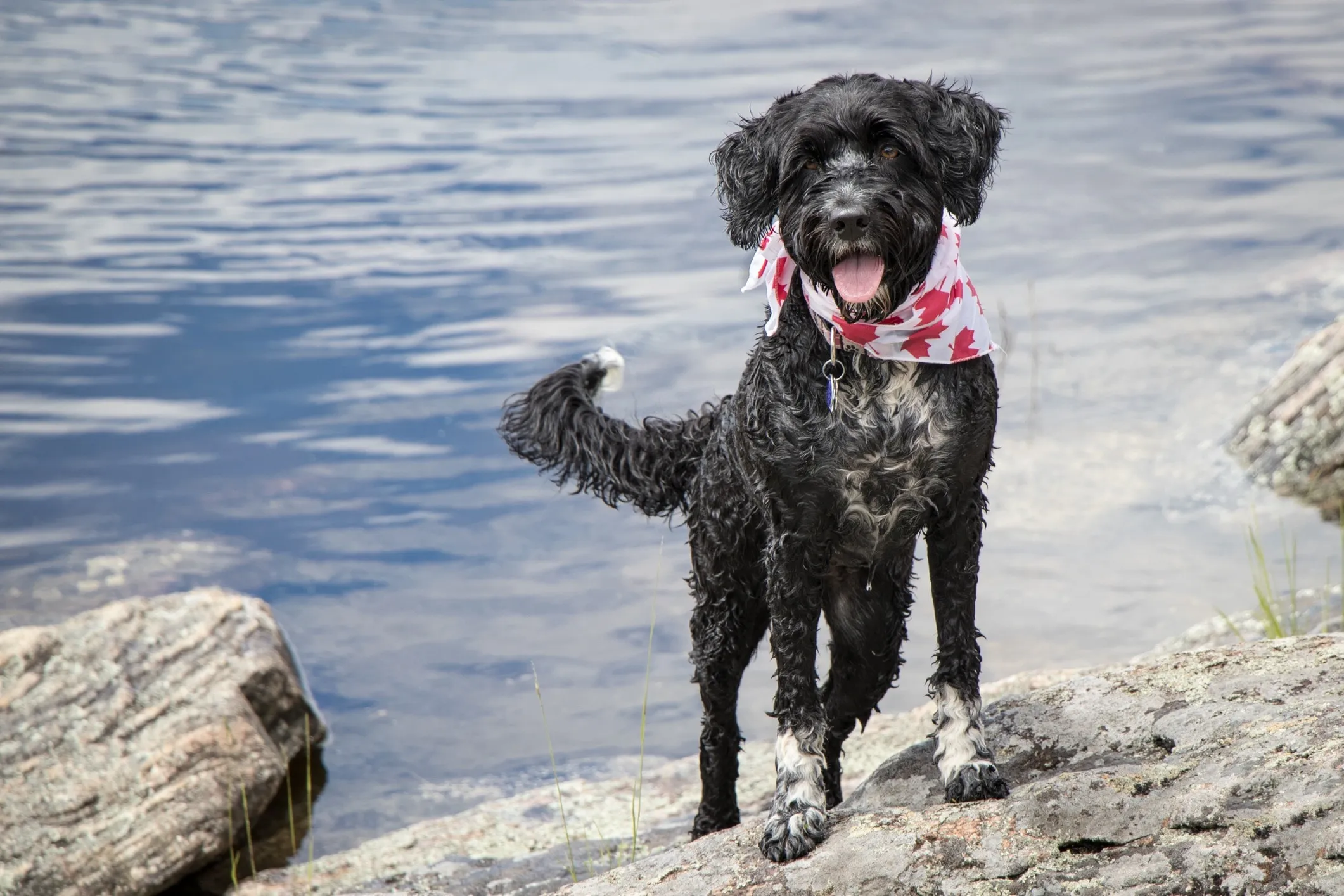 A black and white Portuguese Water Dog wearing a red bandana, looking out at the water
A black and white Portuguese Water Dog wearing a red bandana, looking out at the water
Originally bred to assist fishermen, the Portuguese Water Dog possesses a thick, curly coat that sheds very little. These intelligent and highly trainable dogs are energetic and love water, making activities like swimming and playing fetch with floating toys ideal for them. Their hypoallergenic coat requires regular grooming.
10. Labradoodle
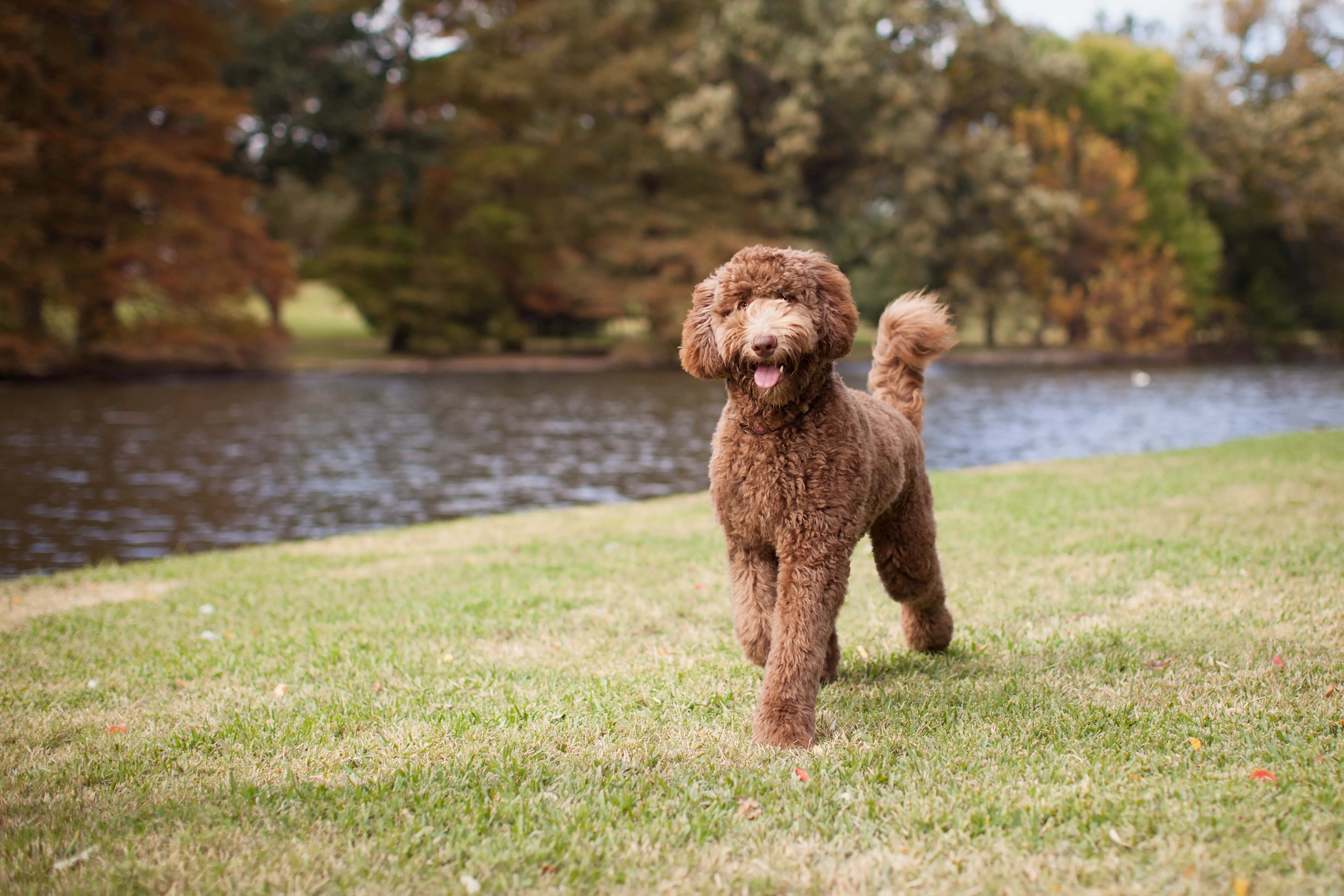 A brown Labradoodle with a wavy coat walking happily in a park
A brown Labradoodle with a wavy coat walking happily in a park
A crossbreed between a Labrador Retriever and a Poodle, the Labradoodle was initially developed to be a hypoallergenic guide dog. They are known for their intelligence, friendly disposition, and low-shedding coats. Labradoodles are highly trainable and gentle, making them wonderful family pets when properly socialized and exercised.
11. Goldendoodle
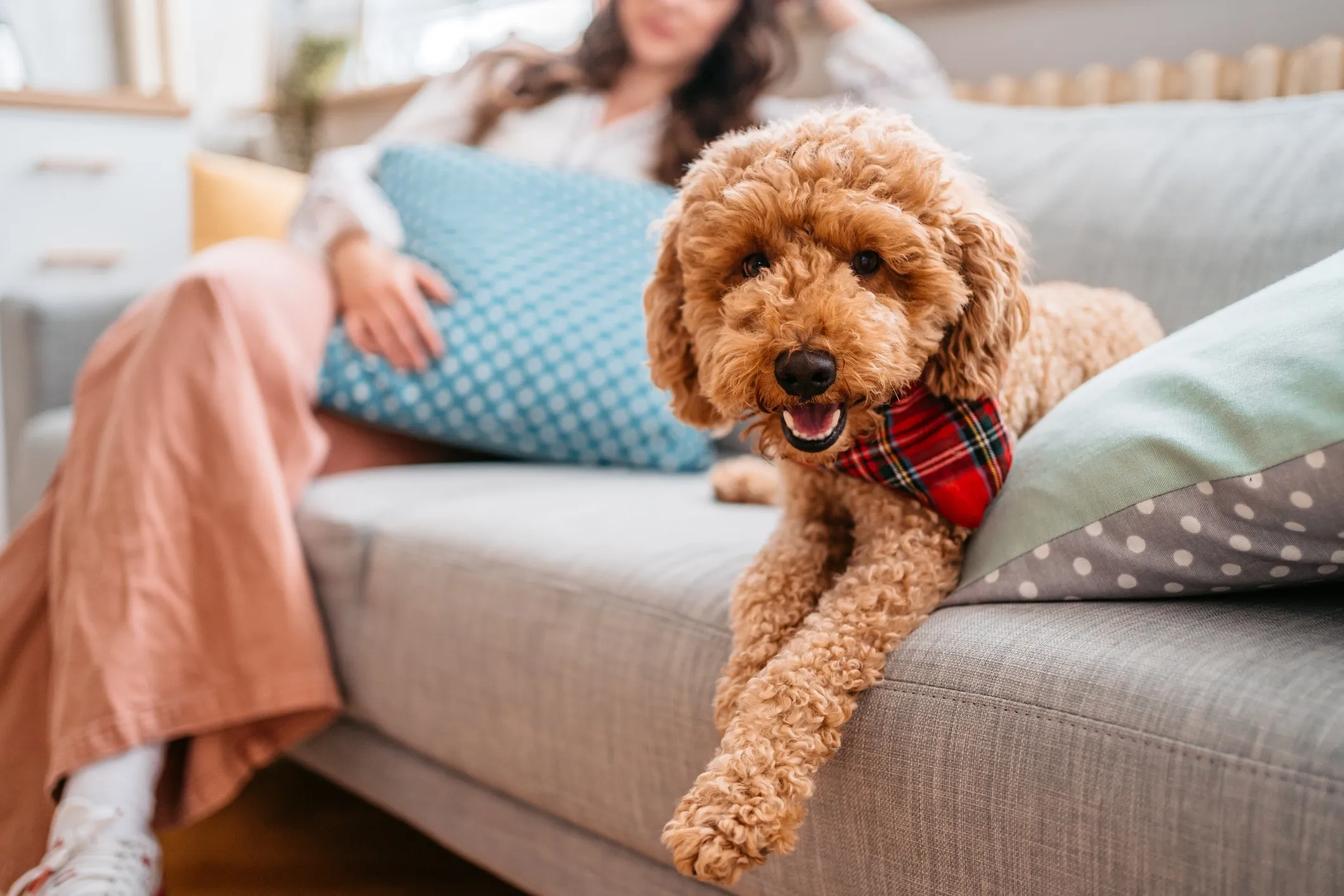 A Goldendoodle with a golden, curly coat relaxing on a couch
A Goldendoodle with a golden, curly coat relaxing on a couch
Similar to Labradoodles, Goldendoodles are a cross between a Golden Retriever and a Poodle. They inherit the Poodle’s low-shedding coat and the Golden Retriever’s friendly, intelligent nature. These dogs are highly trainable and make excellent family companions. Regular grooming is essential to prevent matting of their curly or wavy coats.
12. Lagotto Romagnolo
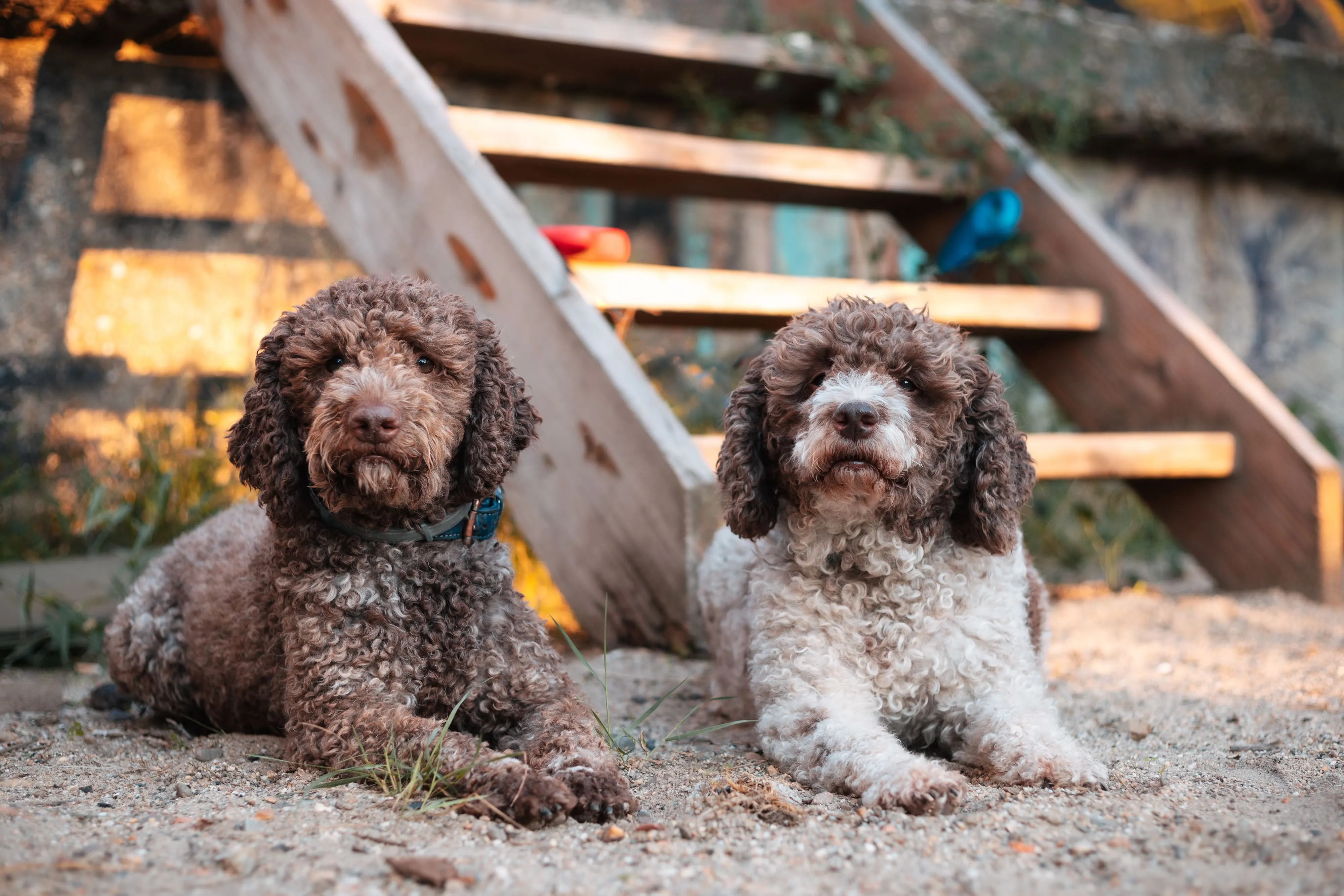 Two Lagotto Romagnolo dogs with curly, woolly coats lying down and looking at the camera
Two Lagotto Romagnolo dogs with curly, woolly coats lying down and looking at the camera
Hailing from Italy, the Lagotto Romagnolo was originally bred as a water retriever. Their curly, woolly coat offers protection in chilly waters and sheds very little. These dogs are known for being good with children and other pets, making them suitable family dogs.
13. Affenpinscher
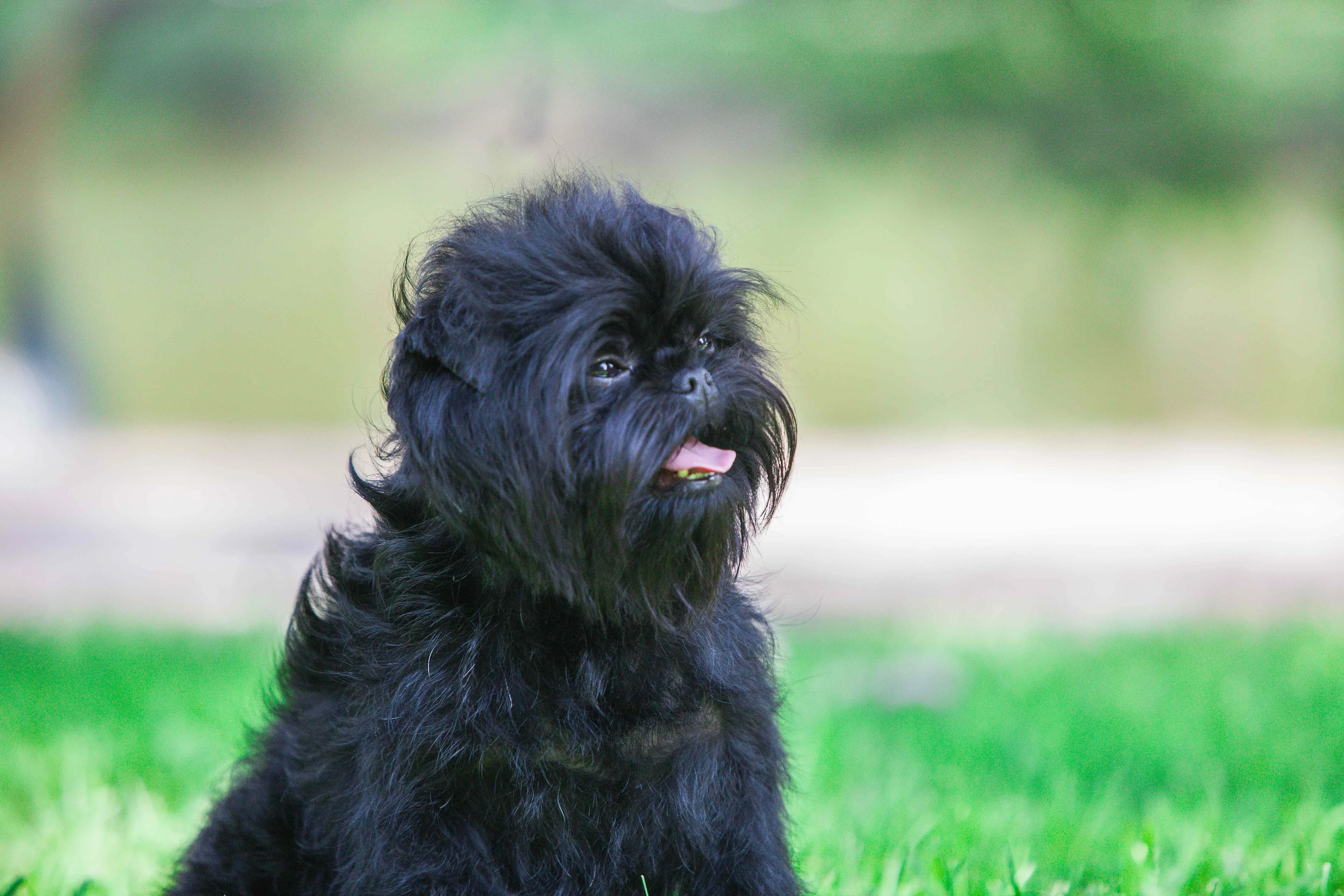 A close-up of a black Affenpinscher dog with a distinctive monkey-like face
A close-up of a black Affenpinscher dog with a distinctive monkey-like face
The Affenpinscher, known for its “monkey-like” face, has a dense, wiry coat that produces fewer allergens. This coat requires regular brushing and a technique called “stripping,” where hair is removed from the root rather than trimmed, to maintain its texture and minimize shedding.
14. Irish Water Spaniel
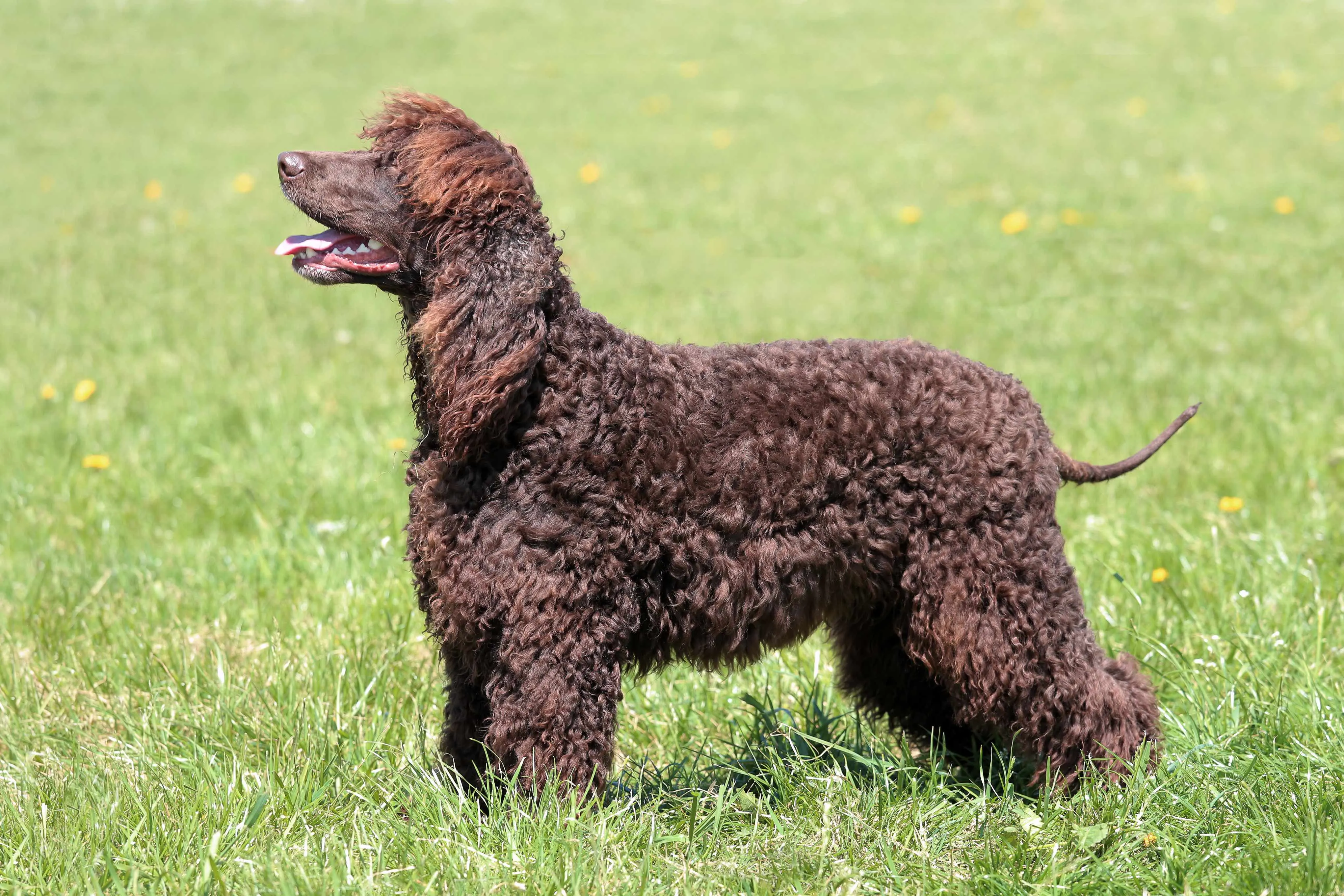 A brown Irish Water Spaniel with a thick, curly coat in profile
A brown Irish Water Spaniel with a thick, curly coat in profile
Another water-loving breed, the Irish Water Spaniel, has a thick, curly, liver-colored coat that sheds minimally. These intelligent and highly trainable dogs are energetic and require ample exercise. Their distinctive curly coat needs regular grooming to stay in good condition.
15. Aussiedoodle
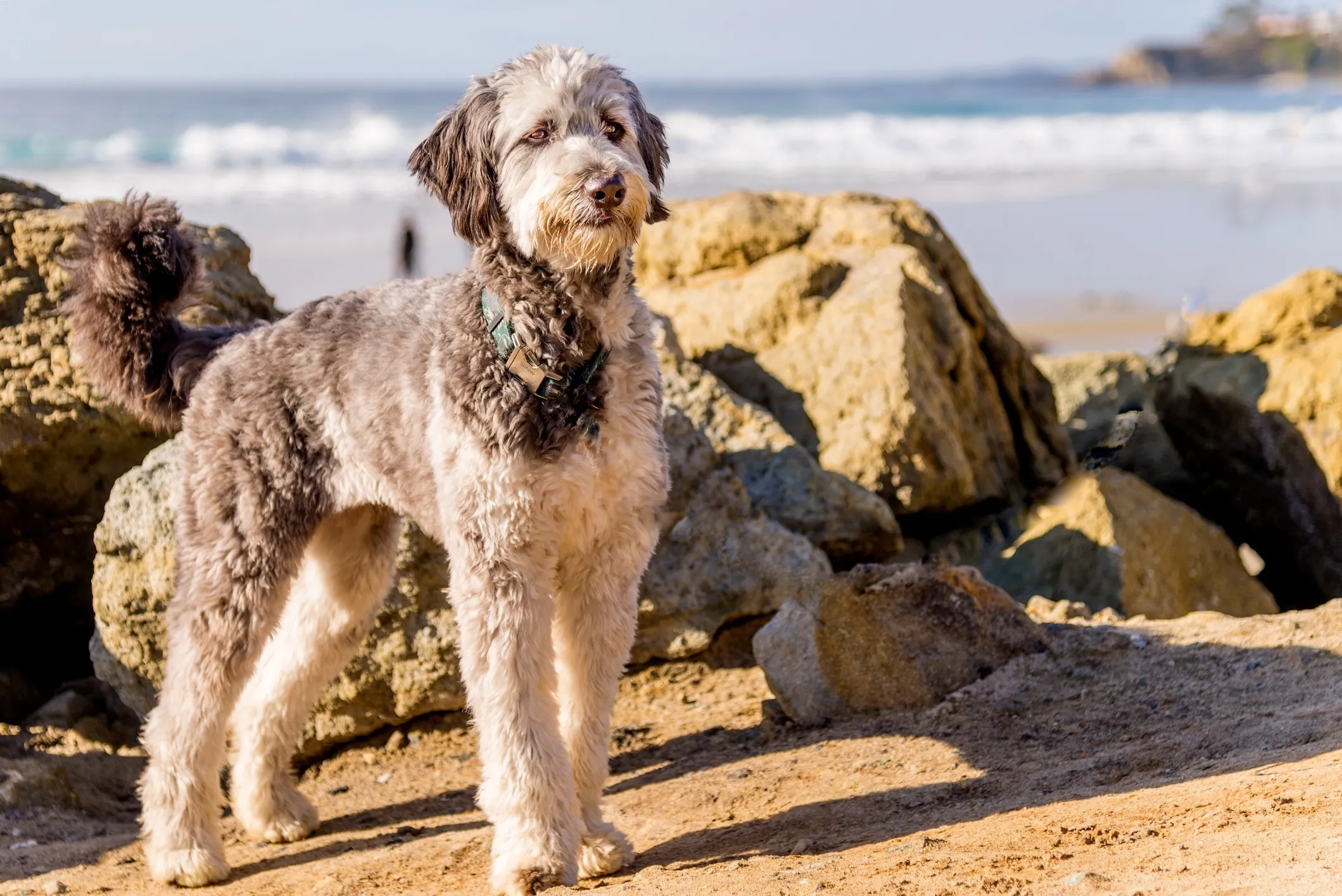 A standard Aussiedoodle standing on a beach, appearing energetic and alert
A standard Aussiedoodle standing on a beach, appearing energetic and alert
An intelligent and energetic crossbreed between an Australian Shepherd and a Poodle, the Aussiedoodle inherits low-shedding qualities and a high drive for activity. To prevent destructive behaviors stemming from boredom, they need substantial exercise and mental stimulation, often provided through puzzle toys and treat dispensers.
16. Bolognese
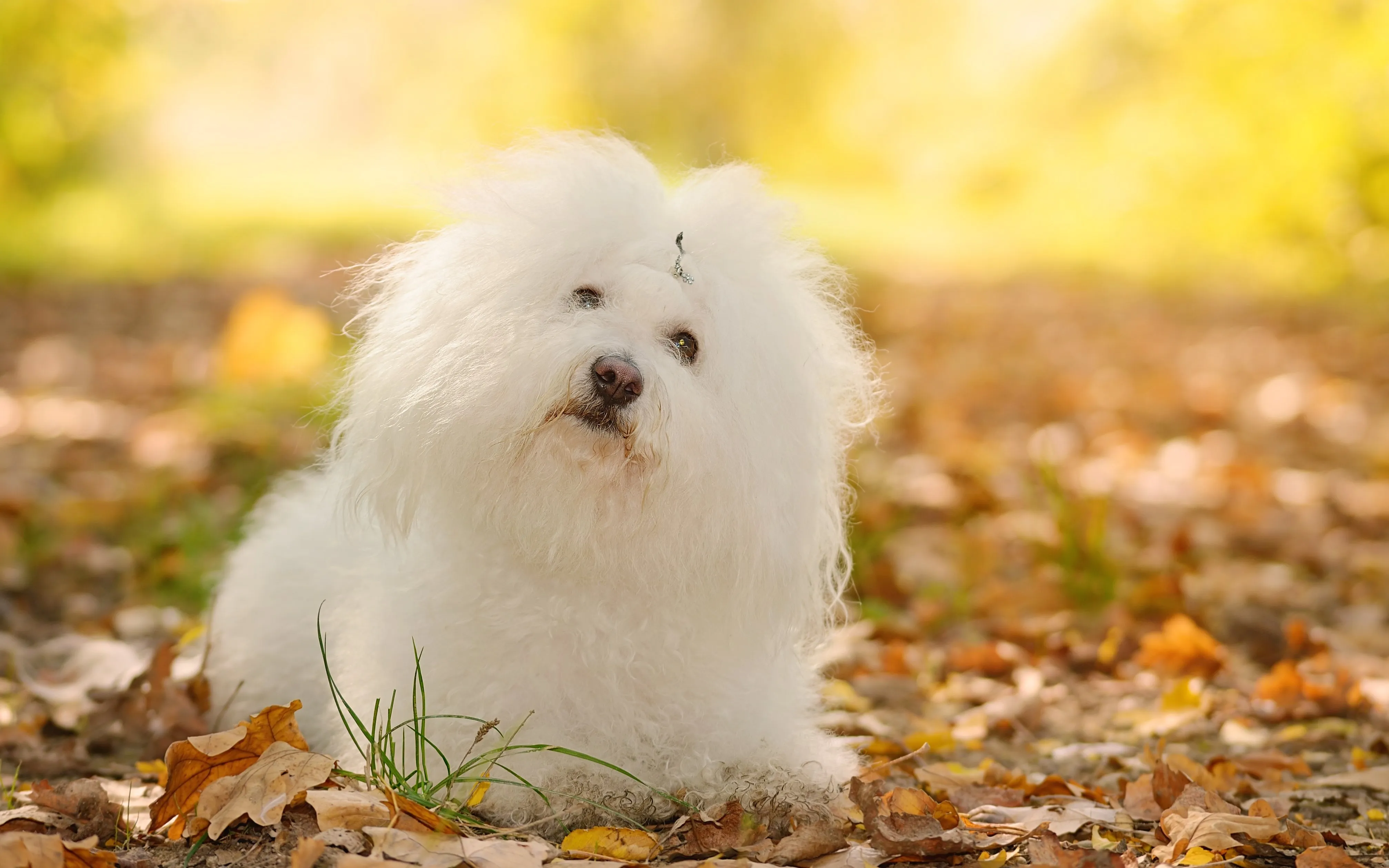 A small, white Bolognese dog sitting in an autumn forest with a fluffy coat
A small, white Bolognese dog sitting in an autumn forest with a fluffy coat
These charming Italian dogs have a long, fluffy white coat that requires significant grooming, despite its characteristically “messy” appearance. Bolognese dogs are playful, easygoing, and generally get along well with children and other pets, fitting into various living situations.
17. Maltese
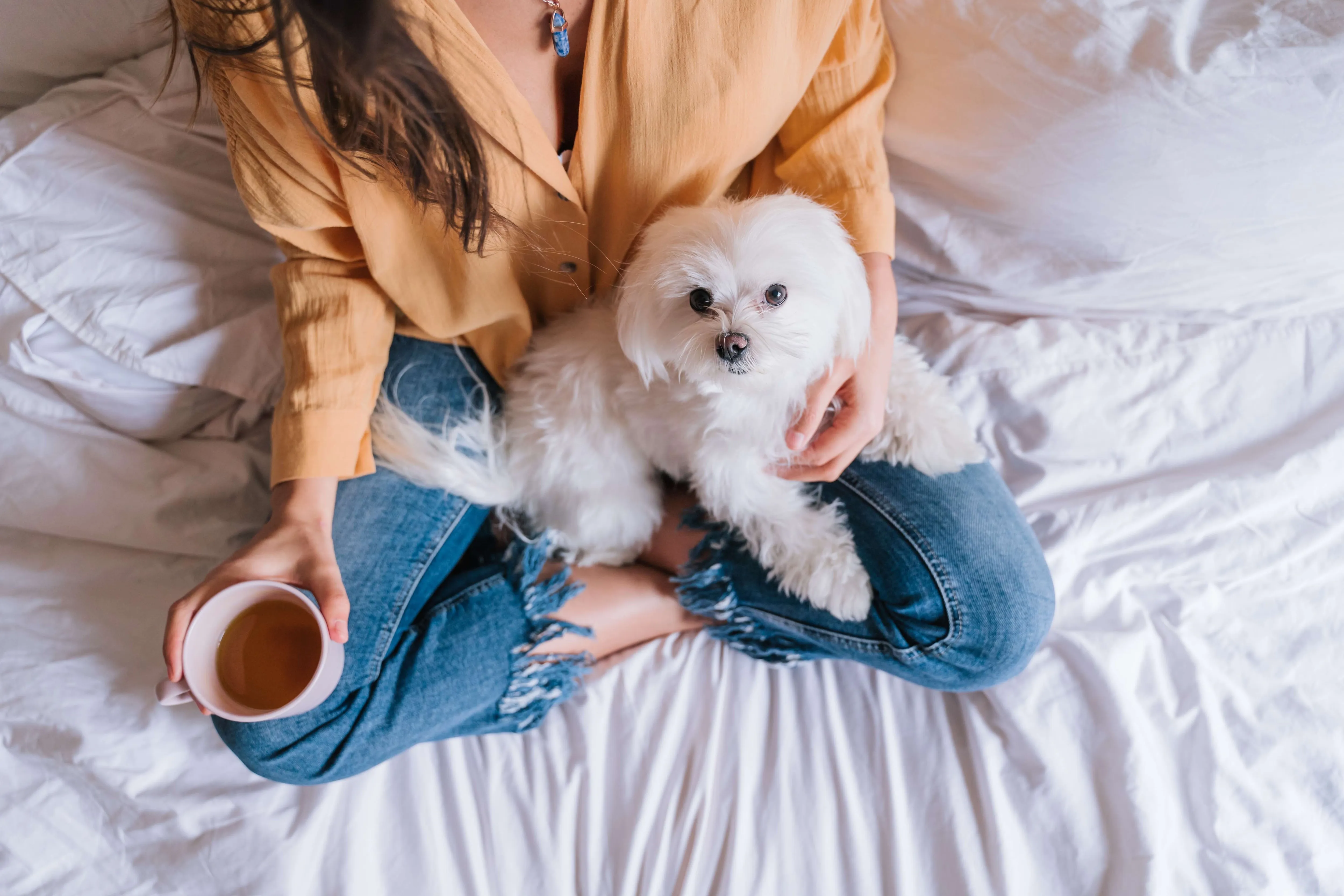 A woman gently holding a small white Maltese dog on a bed
A woman gently holding a small white Maltese dog on a bed
The Maltese is renowned for its luxurious, long white coat that sheds very little. These affectionate and playful companions require diligent grooming to maintain their elegant appearance. For easier management, many owners opt for a shorter “puppy” cut, which can be achieved with dog hair grooming clippers.
18. Soft Coated Wheaten Terrier
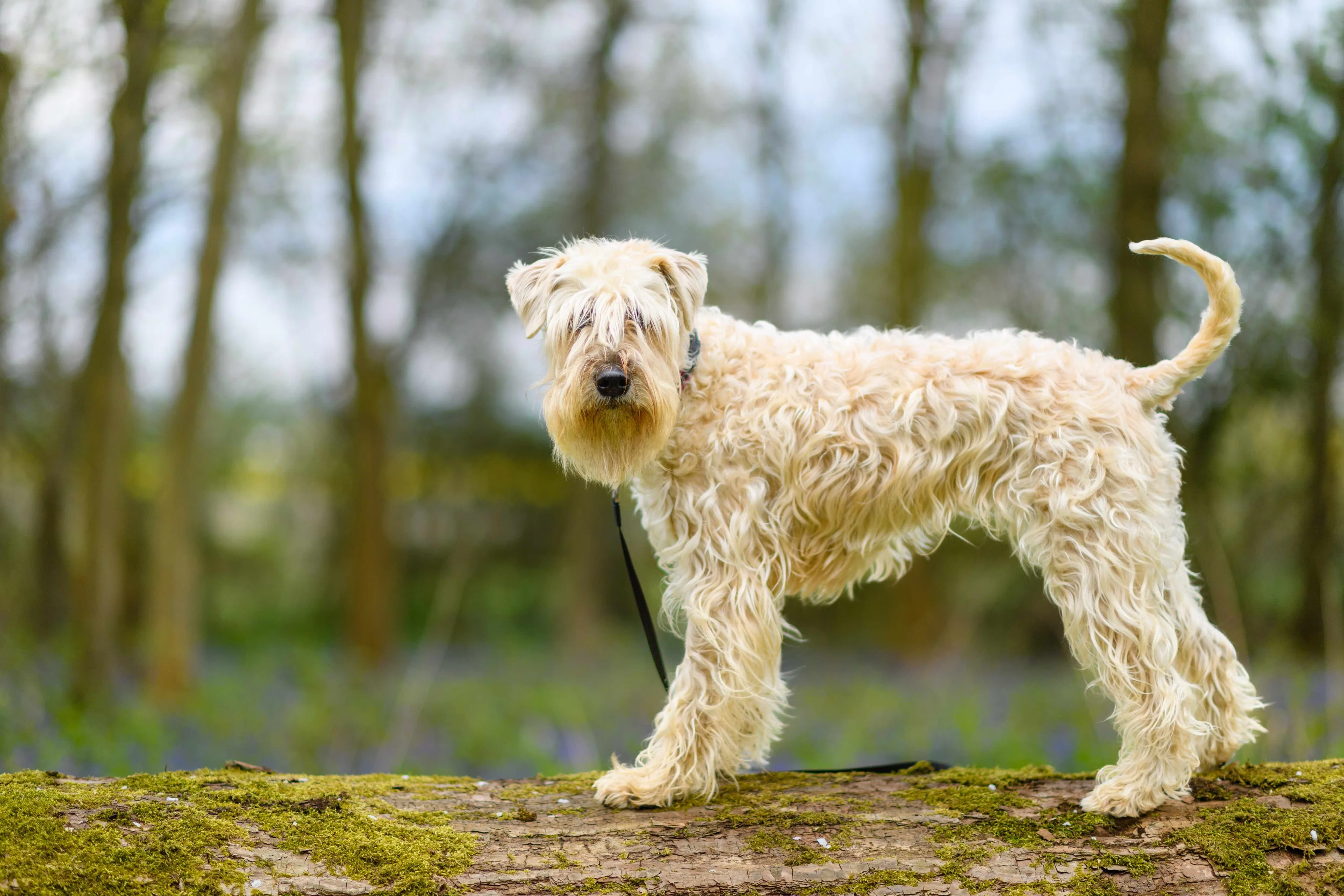 A Soft Coated Wheaten Terrier with a soft, wavy coat sitting on a log
A Soft Coated Wheaten Terrier with a soft, wavy coat sitting on a log
This Irish breed boasts a silky, soft coat that sheds minimally. As terriers, they maintain a high energy level throughout their lives and require ample exercise and mental stimulation to stay content and well-behaved. Consistent grooming is necessary to keep their coat from matting.
19. Coton de Tulear
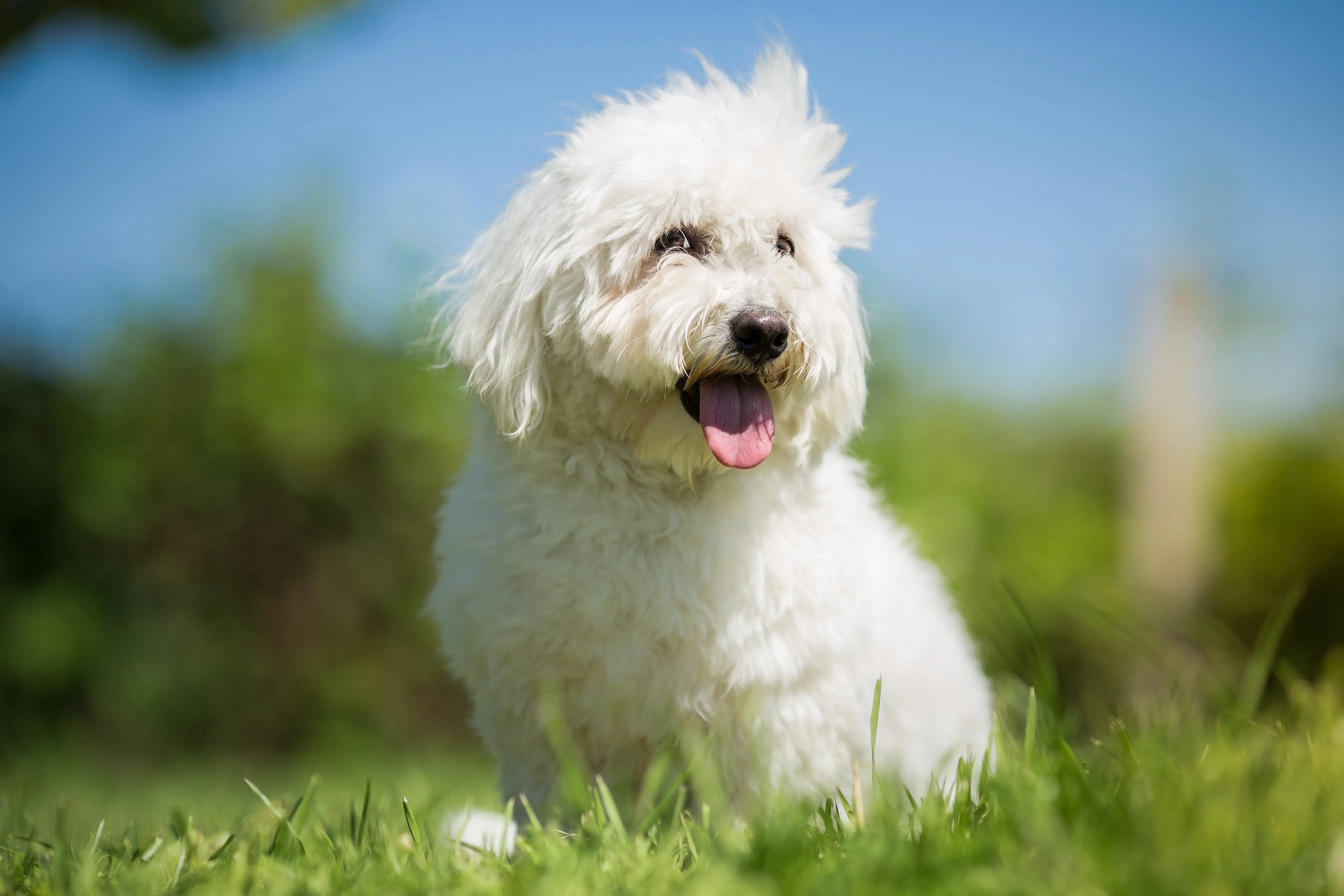 A white Coton de Tulear sitting in grass, its fluffy hair blowing in the wind
A white Coton de Tulear sitting in grass, its fluffy hair blowing in the wind
Originating from Madagascar, the Coton de Tulear is a small breed with an easygoing nature and a soft, cotton-like coat that sheds very little. Their good temperament makes them well-suited for families with children and other pets, especially when introductions are handled properly.
20. Schnoodle
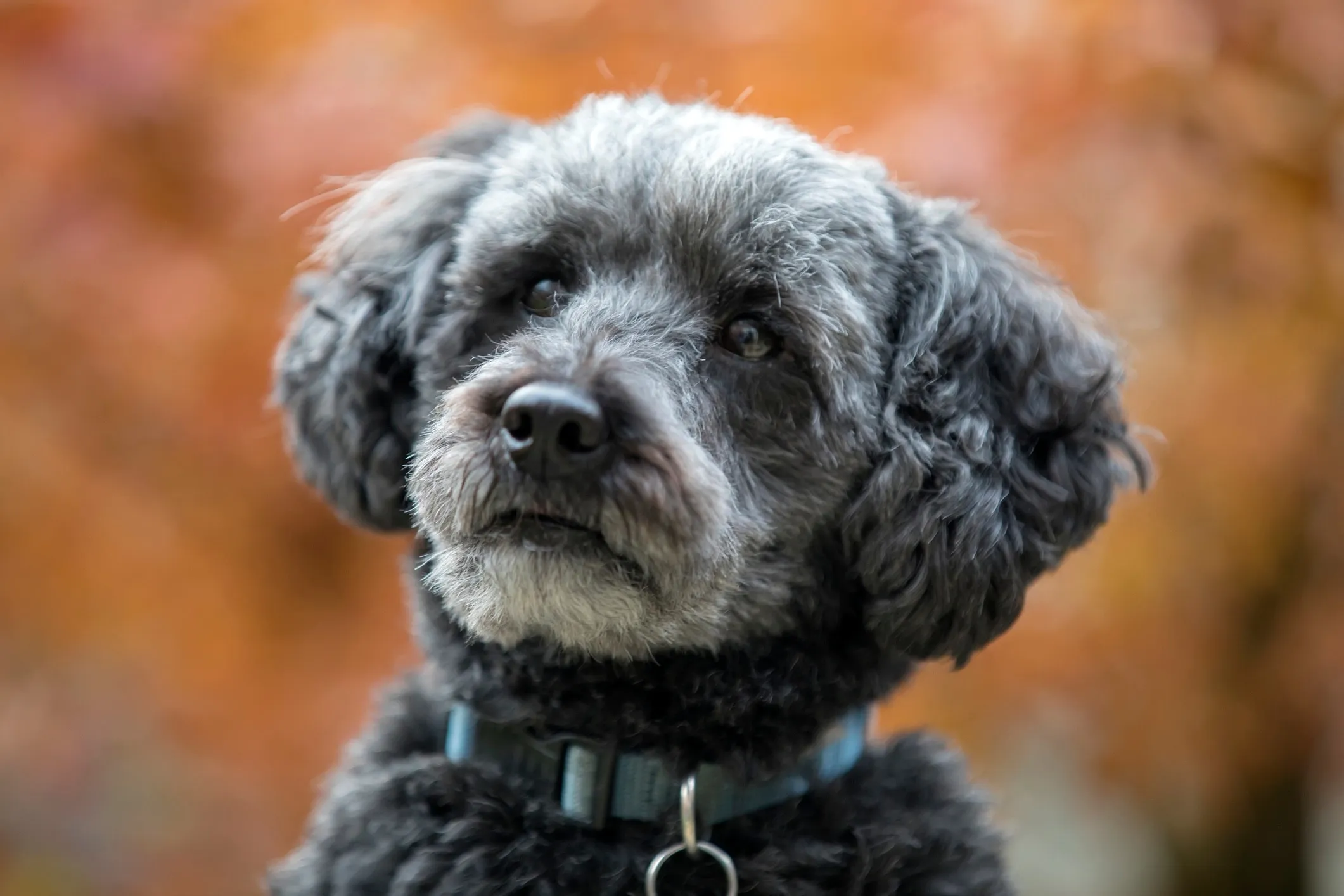 A close-up of a gray Schnoodle with a curly or wavy coat
A close-up of a gray Schnoodle with a curly or wavy coat
A delightful mix of the Schnauzer and the Poodle, the Schnoodle combines the low-shedding qualities of both parent breeds. Their coat can be curly or wavy, but it is consistently low-shedding. These dogs inherit intelligence and affectionate natures, making them wonderful companions.
21. Bedlington Terrier
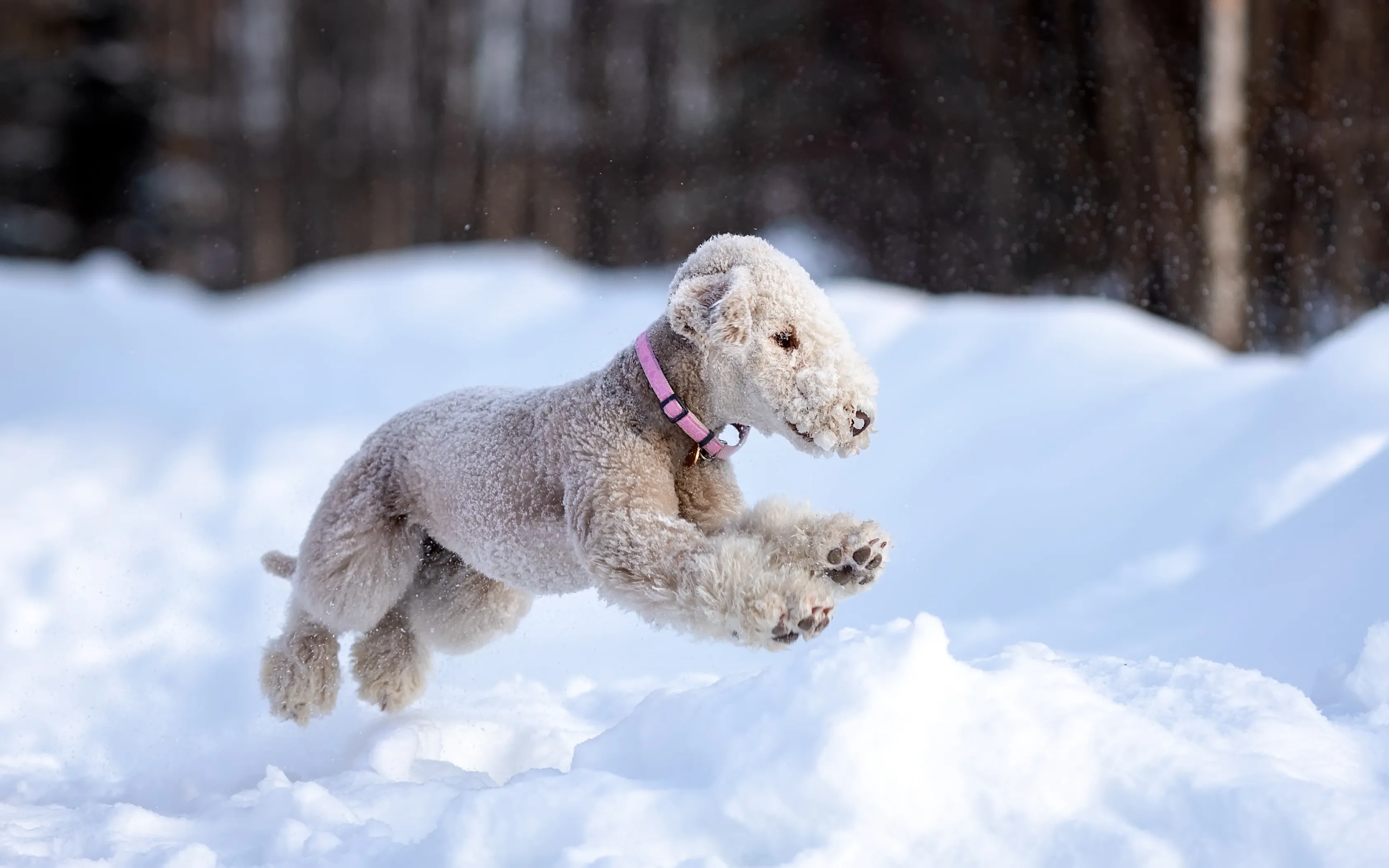 A white Bedlington Terrier with a distinctive curly coat and topknot running through snow
A white Bedlington Terrier with a distinctive curly coat and topknot running through snow
Often described as resembling a lamb, the Bedlington Terrier is a small, curly-haired breed known for its unique topknot and ear tufts. They are devoted to their families and can experience separation anxiety if left alone for extended periods, making a dog camera a useful tool for monitoring them.
22. Xoloitzcuintli (Mexican Hairless Dog)
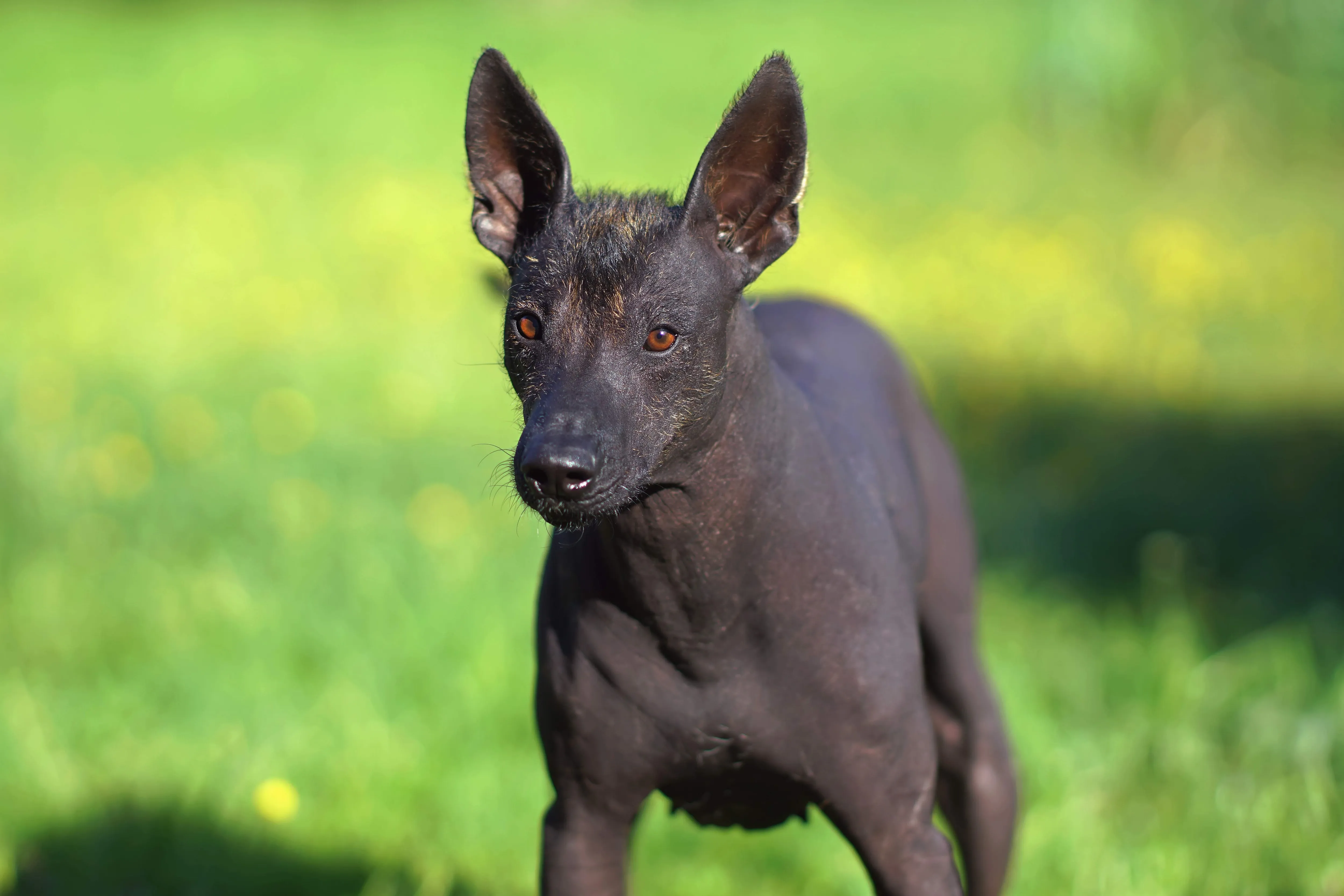 A black Mexican Hairless Dog (Xoloitzcuintli) standing in grass
A black Mexican Hairless Dog (Xoloitzcuintli) standing in grass
The Xoloitzcuintli, or Mexican Hairless Dog, is an ancient and rare breed that is hypoallergenic due to its nearly hairless body. They come in three sizes and can also have a short coat. These dogs are known for their calm demeanor and loyalty.
23. Whoodle
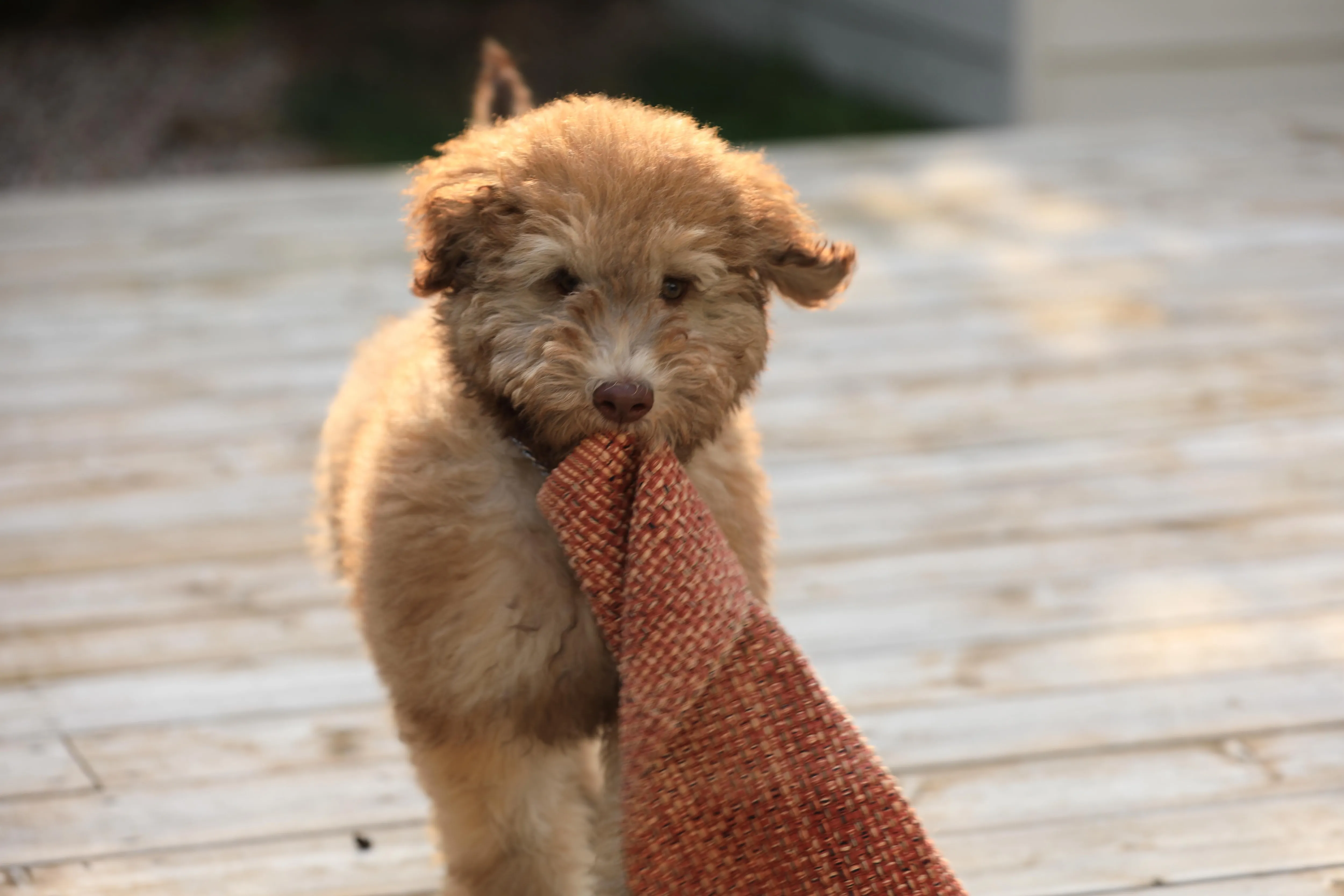 A tan Whoodle puppy playfully dragging a wash cloth
A tan Whoodle puppy playfully dragging a wash cloth
A cross between a Soft Coated Wheaten Terrier and a Poodle, the Whoodle is a friendly dog with very little shedding. They inherit intelligence and an affectionate nature from both parent breeds, making them well-rounded and loving companions.
24. Bernedoodle
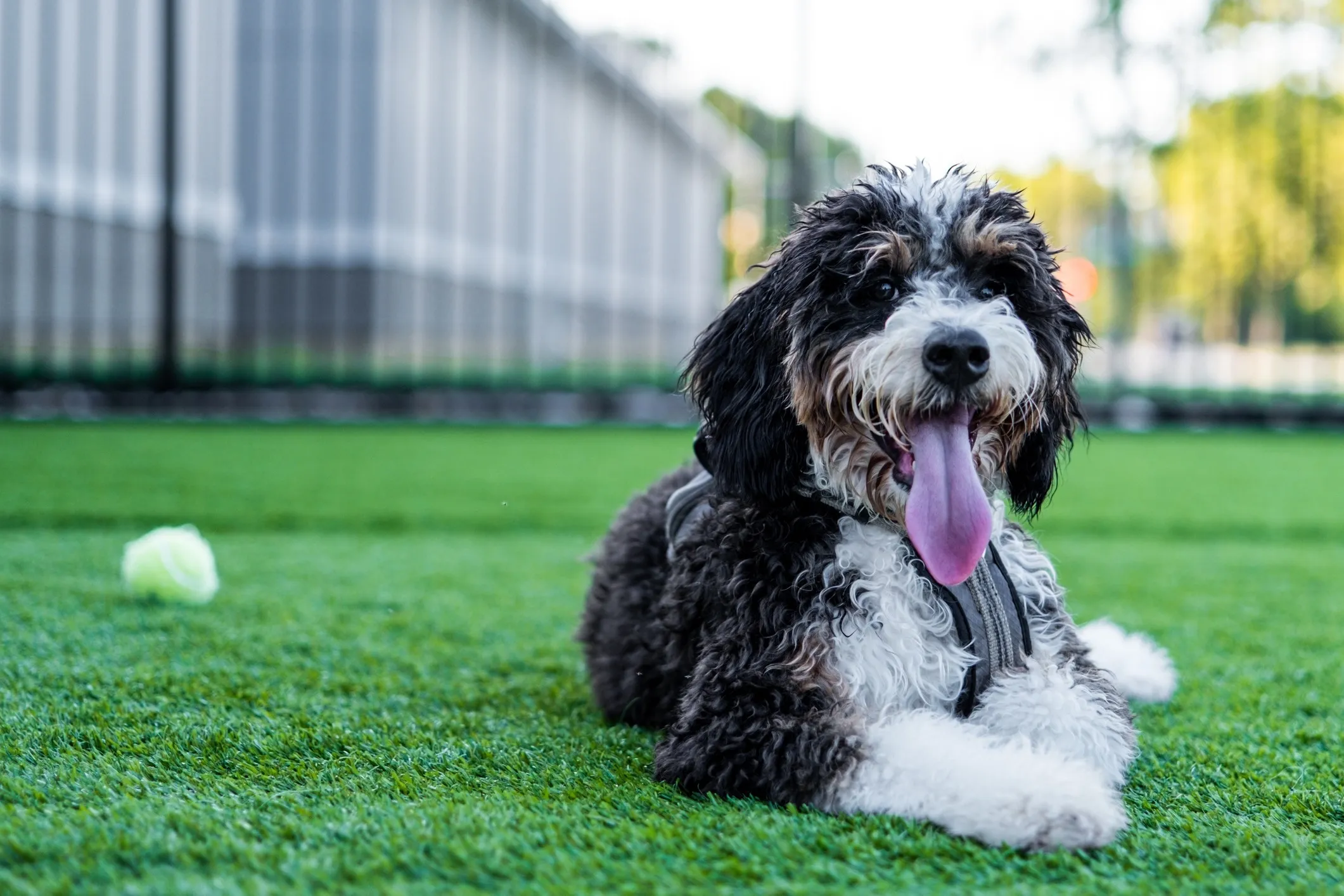 A large Bernedoodle with its tongue out, lying in the grass
A large Bernedoodle with its tongue out, lying in the grass
The Bernedoodle, a cross between a Bernese Mountain Dog and a Poodle, is a large, friendly, and gentle hypoallergenic dog. Their affectionate nature makes them popular with families, including those with children and other pets. Regular exercise is crucial to keep these active dogs happy.
25. Shorkie
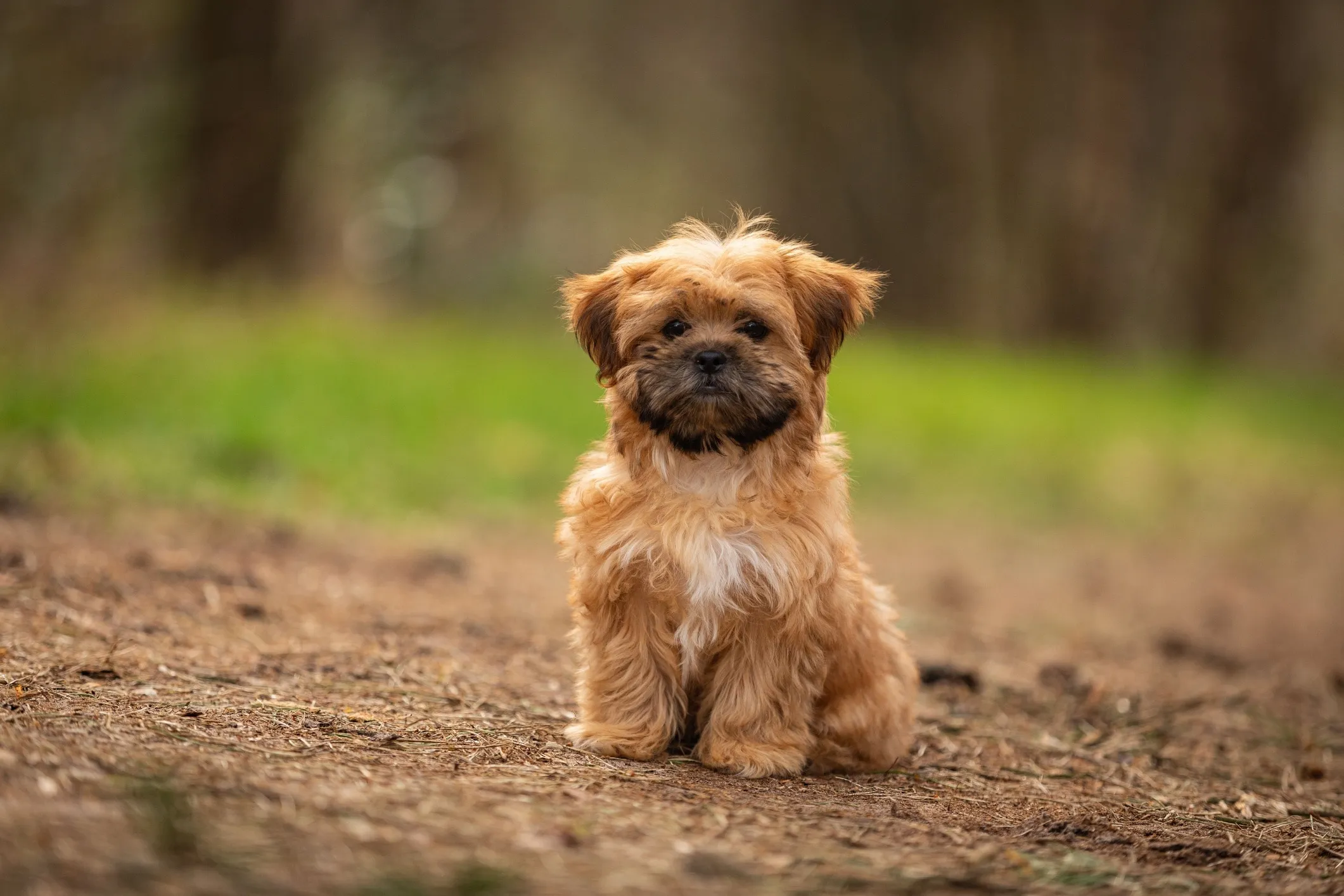 A tan and black Shorkie (Shih Tzu-Yorkshire Terrier mix) sitting on a hiking trail
A tan and black Shorkie (Shih Tzu-Yorkshire Terrier mix) sitting on a hiking trail
The Shorkie is a delightful crossbreed of the Shih Tzu and the Yorkshire Terrier, two already hypoallergenic breeds. They are small, playful, and friendly dogs that require dedication to a regular grooming routine to manage their low-shedding coats.
26. Afghan Hound
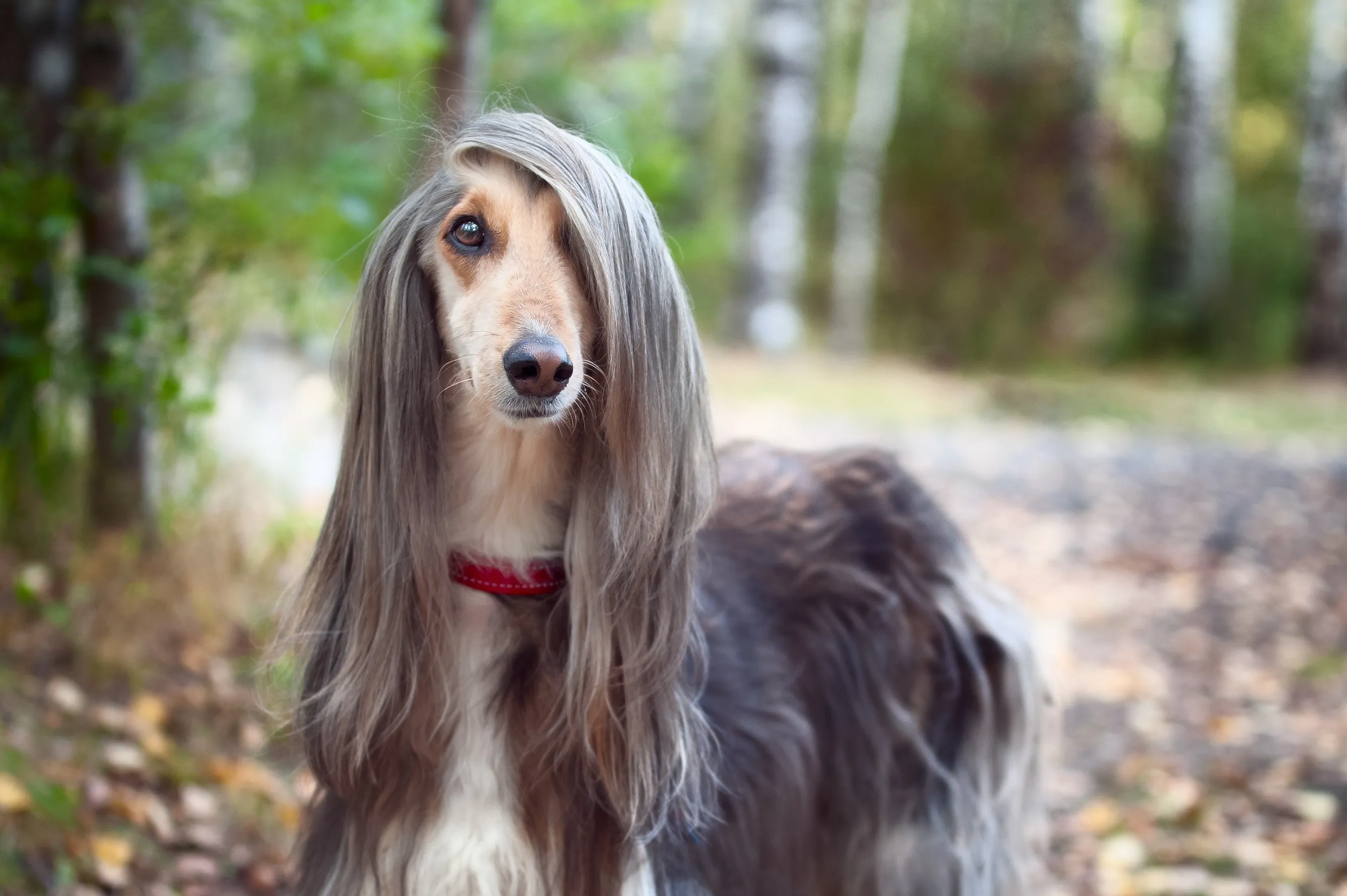 A gray and tan Afghan Hound with a flowing coat looking directly at the camera
A gray and tan Afghan Hound with a flowing coat looking directly at the camera
Known for their distinctive long, flowing coat and elegant build, Afghan Hounds shed minimally. These dogs are built for speed and endurance. While loving towards their families, they can be reserved with strangers, emphasizing the importance of early and consistent socialization.
27. Barbet
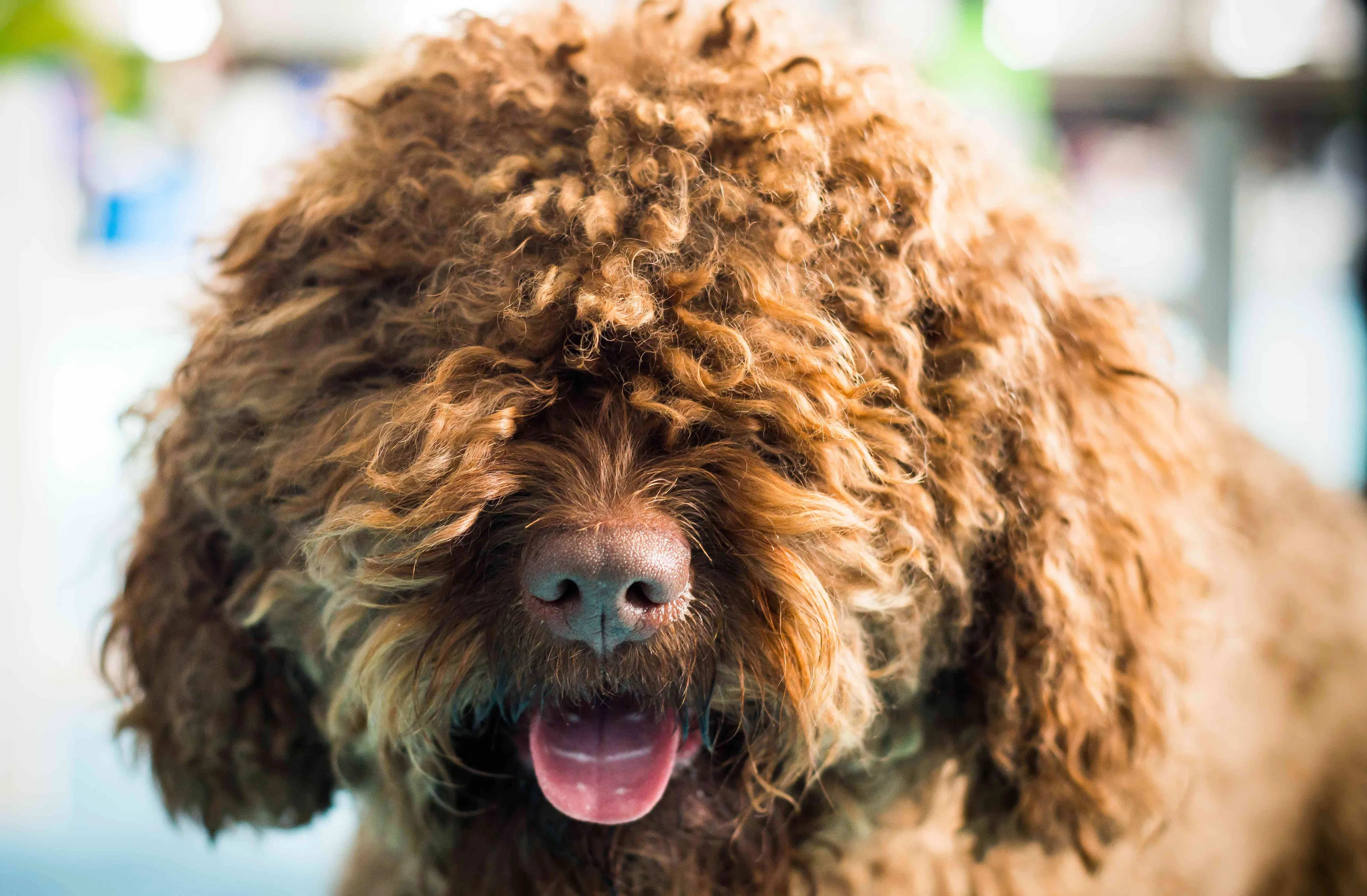 A close-up of a curly red Barbet dog's face, with a shaggy coat
A close-up of a curly red Barbet dog's face, with a shaggy coat
The Barbet, a cheerful dog with a shaggy, woolly coat, is named after the French word for beard. Their protective curly coat sheds very little. These dogs love to swim and require regular brushing, two to three times a week, to maintain their coat’s condition, especially after water activities.
28. Shih-Poo
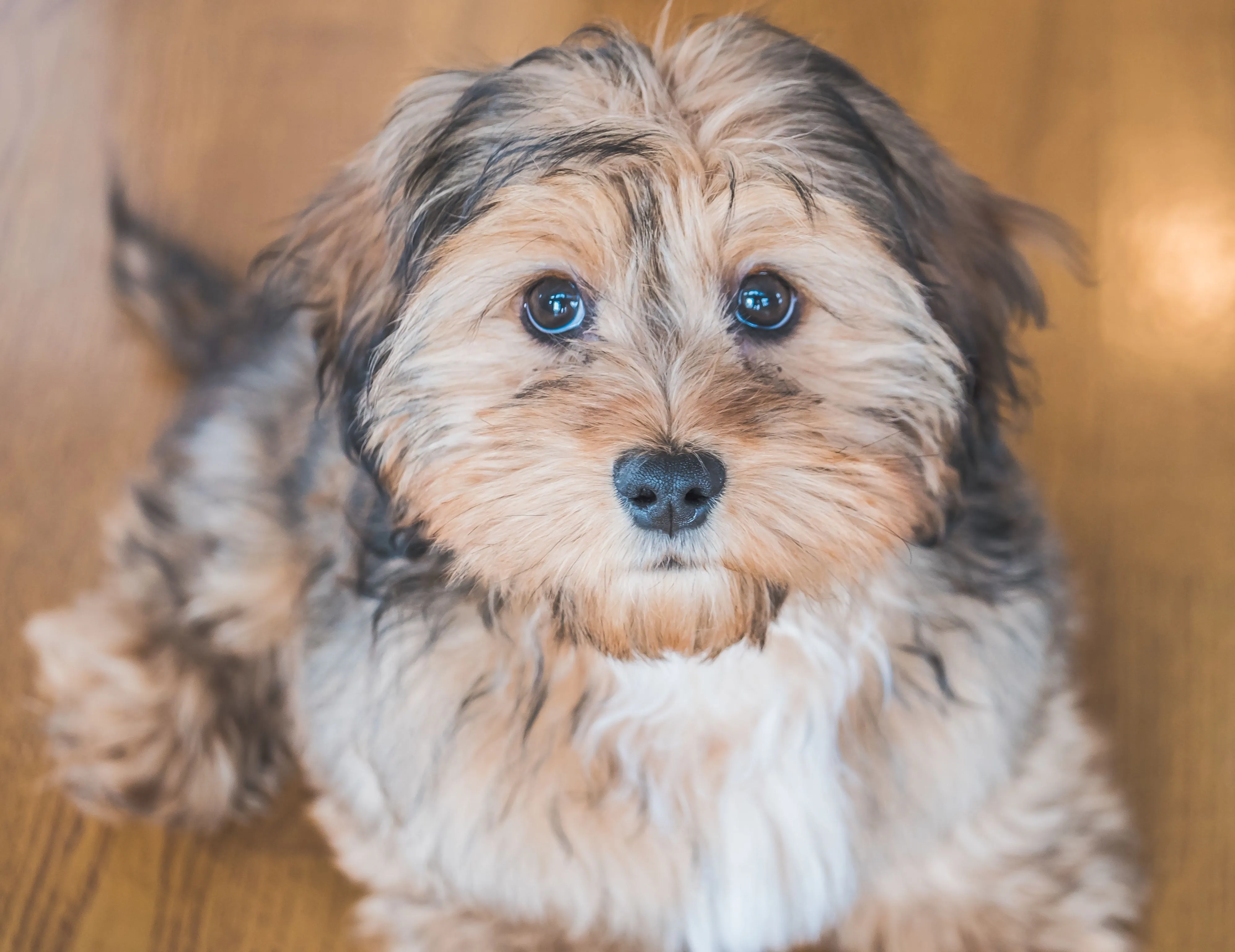 A close-up of a tan and black Shih-Poo dog
A close-up of a tan and black Shih-Poo dog
A charming mix of the Shih Tzu and the Poodle (often Toy Poodle), the Shih-Poo is a small pup that adapts well to various living situations. They require about 30 minutes of exercise daily and a good brushing session each day to manage their low-shedding coat.
29. Peruvian Inca Orchid
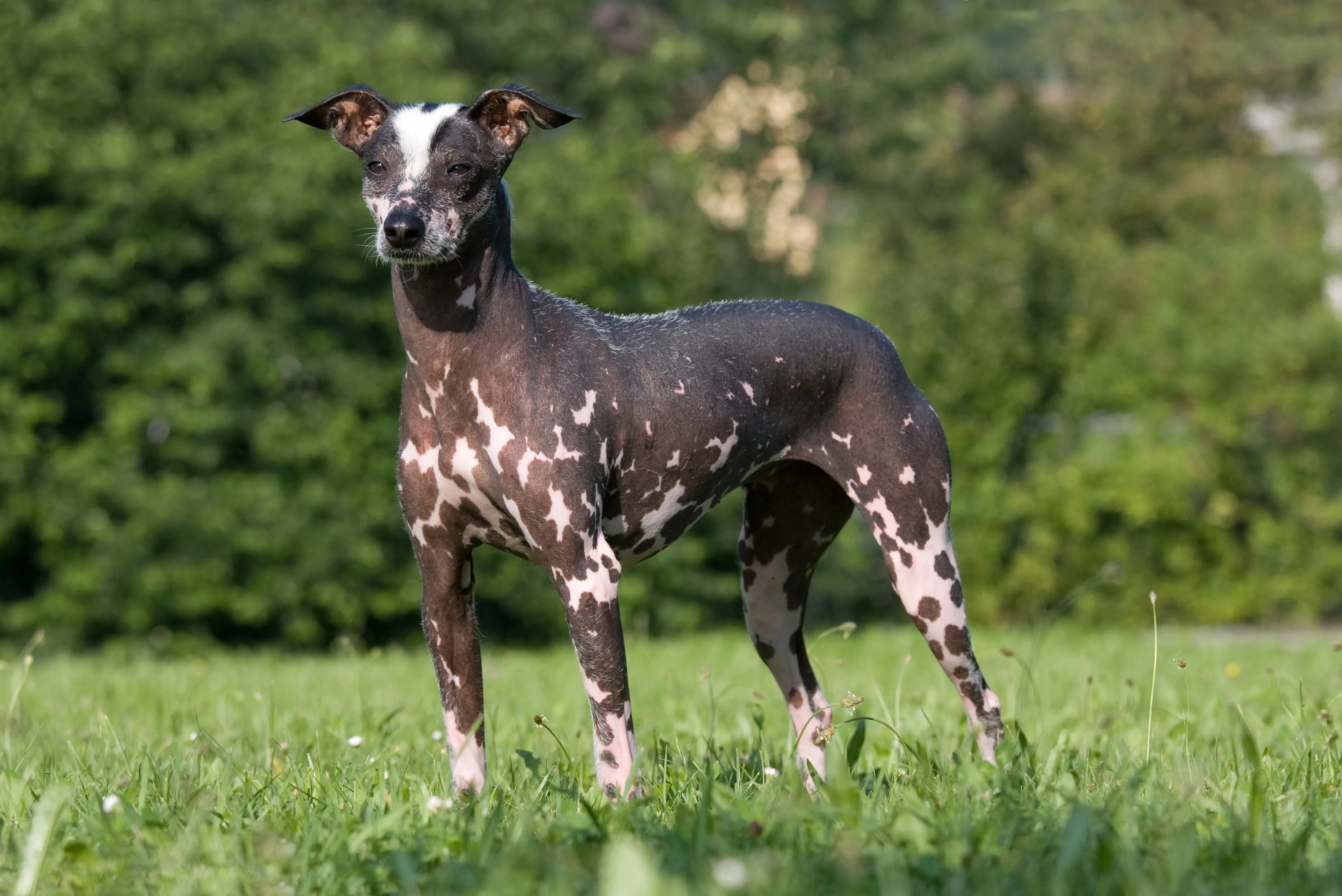 A Peruvian Inca Orchid dog, known for its nearly hairless body
A Peruvian Inca Orchid dog, known for its nearly hairless body
The Peruvian Inca Orchid is a rare and ancient breed that is hypoallergenic due to its nearly hairless body. Available in three sizes, these dogs are the national dog of Peru and are known for their gentle and loyal nature.
30. Malshi
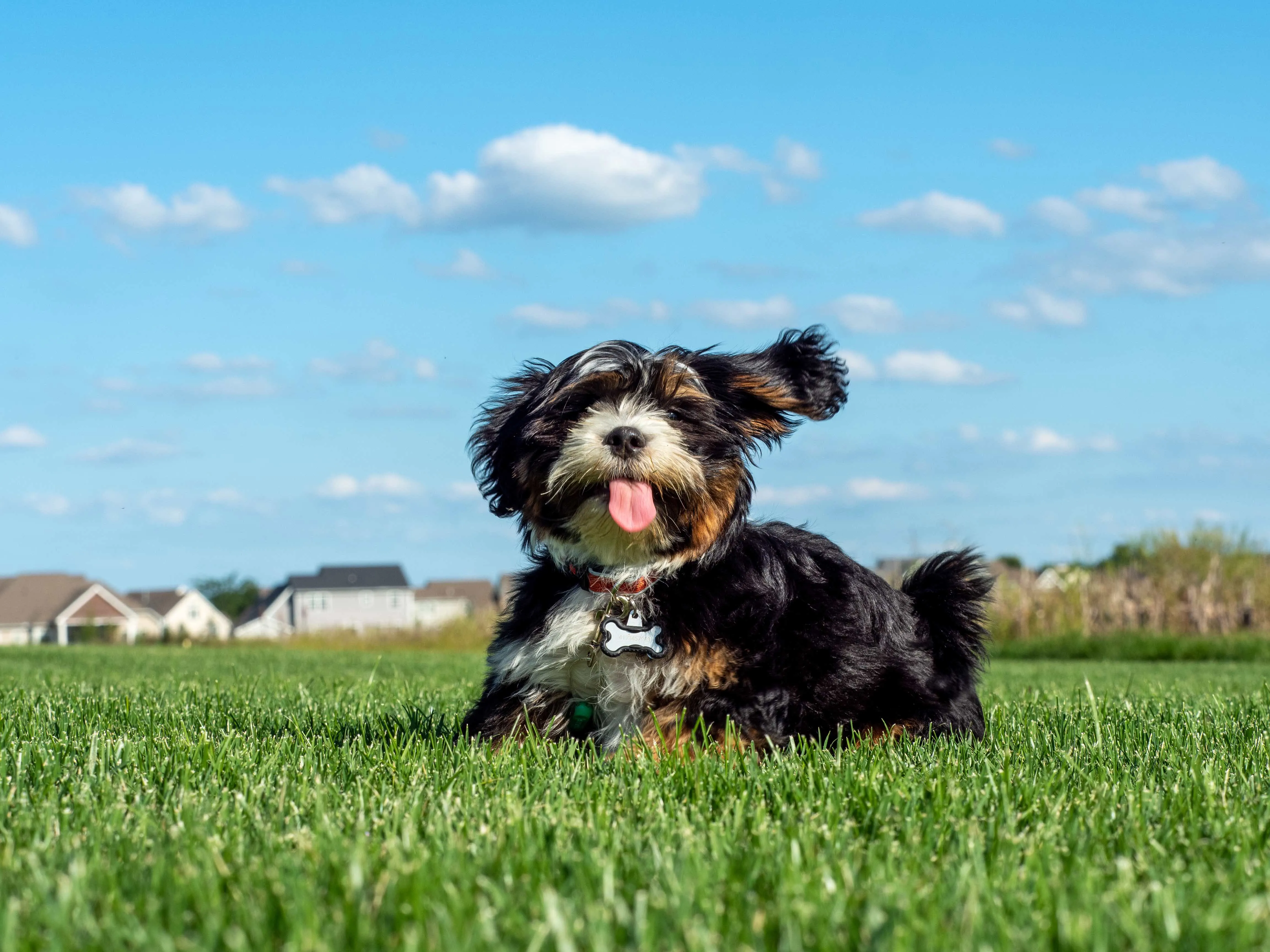 A tricolor Malshi dog sitting in green grass
A tricolor Malshi dog sitting in green grass
A delightful cross between the Maltese and the Shih Tzu, the Malshi is a small, happy, hypoallergenic dog. They thrive on close companionship and require their favorite humans to be nearby to ensure their happiness. Regular grooming is essential for their fluffy coats.
Tips for Living Harmoniously with a Hypoallergenic Dog
Welcoming a hypoallergenic dog into your home is an exciting prospect, but it’s important to be prepared for their specific care needs.
Prioritize Consistent Grooming
Hypoallergenic dogs often require more diligent grooming than other breeds to effectively manage allergens and maintain their coat health. Regular brushing, ideally daily or several times a week, is crucial to prevent matting and distribute natural oils. Bathing frequency can vary, but typically every four to six weeks with a gentle dog shampoo is recommended. For those with significant allergies, specialized products like Allerpet® Dog Dander Remover can be beneficial. Many of these breeds also benefit from professional grooming services, which can include trimming, hand-stripping, or dematting, depending on the specific breed’s coat type. Budgeting for regular grooming or learning to perform these tasks at home is essential.
Maintain a Pristine Living Environment
Minimizing allergens extends beyond your dog’s coat to your home environment. Regular and thorough cleaning is paramount. This includes frequent vacuuming of carpets and upholstery, dusting surfaces, and washing your dog’s bedding and your own linens regularly. Utilizing air purifiers with HEPA filters can significantly reduce airborne dander and other allergens. Ensuring good ventilation by opening windows when weather permits can also help clear the air and maintain a healthier living space.
Consult with Healthcare Professionals
Managing dog allergies effectively is a collaborative effort. It is vital to consult with your doctor or an allergist to develop a personalized plan for managing your allergies. This may involve a combination of strategies, including over-the-counter or prescription medications, nasal sprays, or immunotherapy (allergy shots). Understanding your specific triggers and how to mitigate them is key to a comfortable coexistence with your furry friend. While hypoallergenic dogs reduce dander exposure, avoiding direct contact with a dog’s saliva and urine is also important, as these can still be sources of allergens for some individuals.
Embracing a hypoallergenic dog can profoundly enhance the quality of life for individuals and families dealing with allergies. These wonderful breeds offer the unparalleled joy and companionship of dog ownership without the constant worry of allergic reactions, allowing everyone to experience the full benefits of having a beloved canine in their lives.
